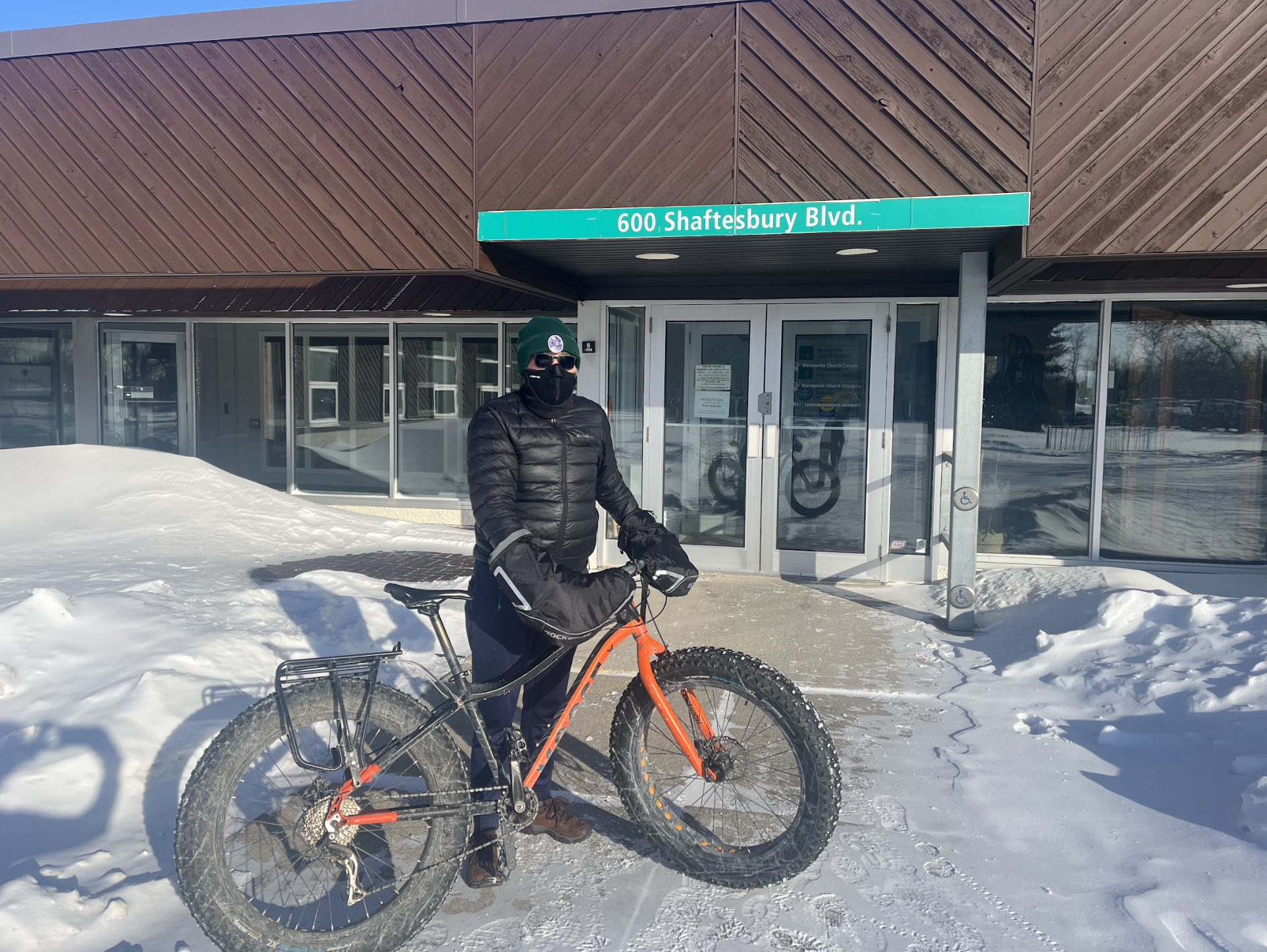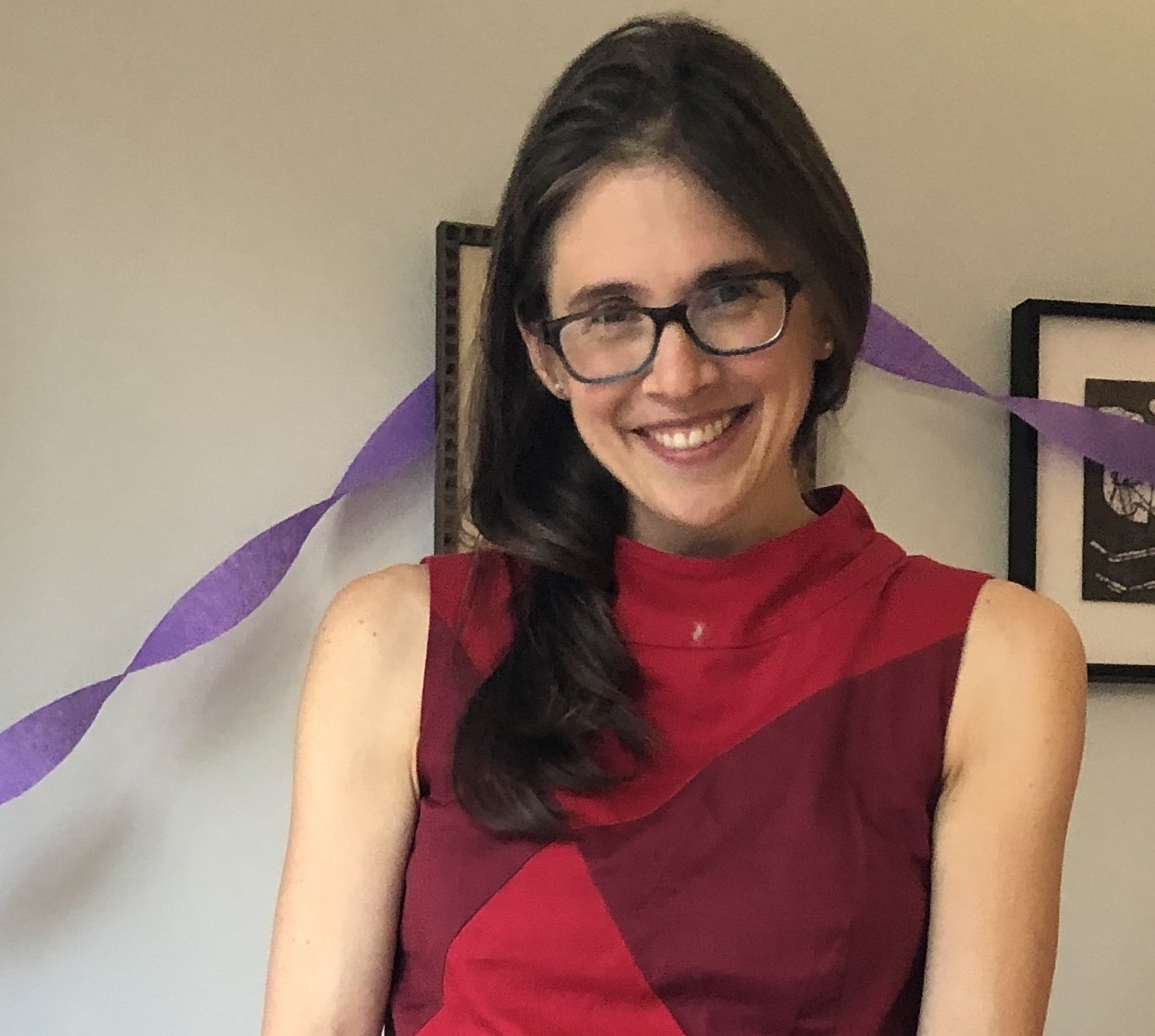March 2025 Blog
The timing was impeccable. I arrived in Winnipeg, Manitoba, to talk with area Mennonites about climate change just as President Trump signed documents to impose tariffs on our neighbors to the north. In the midst of these national and international crises related to imposing one man’s vision for the country, I was able to nurture the positive relationship between our countries. I was warmly welcomed, and I also received a lot of inquiries about our country. I asked for prayer.
Reflections from Winnipeg on Climate Change
Douglas Day Kaufman
The timing was impeccable. I arrived in Winnipeg, Manitoba, to talk with area Mennonites about climate change just as President Trump arranged tariffs on our neighbors to the north. In the midst of crises related to a disruptive new vision for the U.S., it was meaningful to dialogue together. I was warmly welcomed, and I also received a lot of inquiries about our country. I asked for prayer.
Canada and the United States, as the world’s two largest CO2 emitters per capita, face similar challenges for climate action. Canada’s considerable policy progress on carbon pricing is under threat in the midst of an election. The U.S. is actively dismantling climate action programs and funding.
Gracious hosting by Canadian Mennonite University provided warmth in Manitoba’s frigid February temperatures (lows of -29°C/-20°F!). Over a week on campus, I preached, taught several classes, attended a pastors conference, and spoke at a campus forum with ACC Climate Ambassador Sophia Lobe. These joint actions meaningfully extended our partnership with CMU, which has been a long-time host for a Campus Climate Ambassador.
Together ACC and Mennonite Church Canada also kicked off a bi-national climate leaders learning and action cohort. More than 20 people made a significant time commitment to join us in learning about the Bible and the environment, and spiritual leadership on climate. We ask for your blessings on the group’s work as we meet monthly through July.
While in Canada, I was thankful to learn from people like Marilyn Houser Hamm (outdoor photo) and others of Mennonite Church Manitoba’s Climate Action Working Group. I was inspired by the energy and actions of CMU students, and the University’s commitment to sustainability - right now, CMU is adding new geothermal energy.
I am thankful to be part of a church that takes us beyond national interests, that reminds us that we are a larger body of Christ. At ACC, we’re looking forward to growing collaboration on climate action between the US and Canada and extend our gratitude to ACC board member and CMU faculty member Kenton Lobe who made this visit possible.
April 10 Climate Advocacy Day
ACC and our partner MCC are hosting a climate advocacy day in Washington, DC on Thursday, April 10 - and we need your voice! Please join us, details and signup found below!
The Bipartisan Infrastructure Law and the Inflation Reduction Act made historic investments in climate action, including renewable energy incentives and tree planting in low income communities. The Trump Administration's dramatic shifts in policy and funding freezes are endangering this progress.
In my region, the cities of Elkhart and Goshen have not received promised tree planting funding. Funds for our partner organization, Faith In Place, have also been frozen, impacting multiple initiatives in the Midwest, including Anabaptist Mennonite Biblical Seminary who had received a tree planting grant through them.
Congress holds the power to set budget and tax priorities that the Administration must follow, and Congresspeople from both parties need to hear from us. We will focus on the clean energy tax credits.
Join us on April 10! Participants from any state and any level of experience with advocacy are welcome. We will provide training and education on the clean energy tax credits, and facilitate meetings with your congressional offices. If you cannot come to DC that day, you can still attend the training online in a hybrid format and arrange a meeting at your regional congressional offices. If you’re interested, please contact Doug Kaufman by clicking below for details.
Announcing Hannah Stutzman, ACC Advancement Advisor
We are happy to announce Hannah Stutzman’s participation on the ACC team!
Hannah brings extensive experience in environmental conservation, sustainable community development initiatives, non-profit management, and fundraising. Hannah is currently the Board Chair for Equitable Origin, a nonprofit focused on a more just and equitable energy sector and indigenous rights.
She previously served as the Executive Director of Amazon Conservation Association, which seeks to unite people, science, and innovation to save some of Earth’s greatest wild places. Hannah loves to help purpose-driven organizations thrive and fostering deeper connections between people and the causes they care most about. She looks forward to engaging with the ACC community to advance climate action rooted in faith and justice.
Hannah has a Master’s of Environmental Management from Yale University and a bachelor’s degree in Anthropology from Bryn Mawr College. She’s originally from Goshen, Indiana and currently lives in Washington, DC where she likes to bike and hike in her neighborhood National Park (Rock Creek Park!) with her husband and two young daughters.
Indiana Renewable Energy Day
Executive Director Douglas Day Kaufman was part of three Mennonites in the Goshen area who participated in Renewable Energy Day in Indianapolis on January 21, 2025. Doug, Glenn Gilbert, and Paul Steury met with state Senator Blake Doriot and state Representative Joanna King about community solar. It was a great time to reconnect with partners in these efforts such as Jalisa Mauldin, Indiana Outreach Coordinator with Faith in Place.
Religion & Science Conference at Goshen College
Our executive director Rev. Douglas Day Kaufman will be the homilist at the annual Religion and Science Conference at Goshen College March 7-9, 2025. The theme is “Living Well During Climate Change” with Dr. Sarah Fredericks, Associate Professor of Environmental Ethics, The University of Chicago Divinity School. Two of the talks are public and one talk and the homily are for registrants only. A Zoom option is available.
This is the second time Doug has preached at the conference; the first time was when climate scientist Dr. Katharine Hayhoe was the speaker.
Registration for the event is still open! Zoom coverage is available for those unable to attend in person.
ACC Alum Spotlights Fellow Alum’s Climate Journey
Read Sierra Ross Richer’s (ACC ‘Climate Pollinator’ author) story about Levi Geyer (ACC Campus Climate Ambassador 2019-2020) who practices sustainable agriculture by foraging nuts and planting hickory trees, improving Iowa farmland for future generations. Geyer said, “I see creation care as a big part of my faith. And doing agriculture in a way that is good for the Earth is really important to me.” You can read the article here.
Clean Energy Tax Credits in Jeopardy
An advocacy opportunity from our partners at Mennonite Central Committee
An upcoming budget bill threatens to cut popular clean energy tax credits to pay for expanded tax cuts and increased spending on immigration enforcement. Energy efficiency incentives and tax credits for solar panels, wind energy and electric vehicles are now in jeopardy. These tax credits create jobs, reduce emissions, save consumers money, and help to meet growing energy needs.
Take action: Urge Congress to protect clean energy tax credits
January 2025 Blog
We are so gratified for your contributions in December totaling $26,266. You have been generous during this critical time and we appreciate you. Many new and returning supporters gave generously and we are so happy to see our base of support be sustained and grow as ACC transitioned to become an independent, yet collaborative, organization.
Thank you for supporting ACC!
We are so gratified for your contributions in December totaling $26,266. You have been generous during this critical time and we appreciate you. Many new and returning supporters gave generously and we are so happy to see our base of support be sustained and grow as ACC transitioned to become an independent, yet collaborative, organization.
Monday will be a day of contrasts, as Americans honor the vision of Martin Luther King, Jr, whose vision of peace and community has inspired many and resonates with Anabaptist principles. Americans also inaugurate a leader whose vision is different from that of King’s.
While political rhetoric often denies the climate crisis, and there will certainly be policy setbacks, we can keep making progress towards climate justice. Thank you for being part of our community working to equip and activate people to seek climate justice through Anabaptist values, community and faith. I am thankful that you are here.
Hans Hut Holiday Hat Winners
All those who contributed over the campaign were entered into a drawing for Hans Hut Holiday Hats. Winners included:
Steve Brenneman (Goshen, IN)
Don Kraybill (Harleysville, PA)
Caleb Schrock-Hurst (Harrisonburg, VA)
Anna Ruth Hershberger (Elkhart, IN)
Dave Brubaker (Dayton, VA)
Dave Hockman-Wert (Corvallis, OR)
Pictured on the right is Caleb Schrock-Hurst wearing his Hans Hut Holiday Hat.
This year is the 500th anniversary of Anabaptism, and this is our way of honoring the early Anabaptist eco mystic Hans Hut, who taught “the gospel of all creatures.” Christ is present in and his work impacts all creatures. Christ cares about all creation.
Los Angeles Fires
Our hearts ache and our minds reel as we see the fires in the Los Angeles area. The death toll is over 25 people, thousands of homes have been destroyed as well as eleven houses of worship.
Among those affected is the thriving Anabaptist community in the region, as reported in Anabaptist World. Among the homes destroyed is a Church of the Brethren parsonage in Pasadena, the home of pastors Juan Pablo Plaza and Adriana Rios.
Pastor Helen Mfwilwakanda of Wholicare Community Church, a primarily Congolese Mennonite congregation, participated in a 2020 ACC climate change retreat with 25 CA leaders. Sharing her experience this week, Helen said: “At first we were certain the fire would be contained. But then the Santa Ana winds made it hard for the fire crews. We were up the whole night watching the news in disbelief, then we had to water the roof. As the fire was raging and approaching, we left.”
Scientists have shown that climate change is driving longer, more dangerous wildfire seasons. In Los Angeles, great irregularity in rainfall and temperatures – two very wet winters followed by the hottest summer and the driest winter on record - have fueled these destructive fires. While reducing carbon emissions is a critical response, of course at the moment we pray for the people of Los Angeles, firefighters and first responders, and we support the work of one of our partners, Mennonite Disaster Service, as they prepare to help the churches there heal from and respond to this crisis.
Register by Monday for Canadian Climate Cohort
Canadians — this is a reminder to register for Faithful Leadership in the Climate Crisis: Responding in Hope. This unique 6-month cohort program begins in February in Manitoba and is designed for pastors and church leaders who seek to discern God’s call in a time of environmental crisis. This combines in person gatherings in Winnipeg and Kitchener with virtual gatherings in between. If you are interested, please click here to learn more and register by January 20!
Creation Care in Business
How can leaders integrate climate action in their businesses? Follow this link to read what Marketplace, the magazine of Mennonite Economic Development Associates (MEDA) wrote about the ACC-sponsored seminar at their annual convention in Atlanta.
Three business owners, Brent Alderfer, Jim Miller, and Steve Brenneman joined ACC Executive Director Douglas Day Kaufman for this seminar to talk about climate action and the values that inform it. Doug spoke about the special responsibility businesses have in creation care because they usually have a much larger ecological footprint.
Advocacy Internship
We are pleased to once again offer an advocacy internship this summer! The student intern will engage in advocacy, organizing, and lobbying with Mennonite Central Committee U.S. National Peace & Justice Ministries, with a specific focus on mobilizing the Anabaptist community around climate issues at the Mennonite Central Committee office in Washington DC. Information coming soon on our website.
December 2024 Blog
For Steve Pardini, member of Harrisonburg Mennonite Church, climate change work and caring for creation are directly linked to faith. As he sees it, “stewardship calls for responsible dominion over the earth, justice demands advocacy for those most vulnerable to climate impacts, and peacemaking addresses violence and conflict fueled by climate change.”
Pastoral Care for Climate Retrospective: Steve Pardini
For Steve Pardini, member of Harrisonburg Mennonite Church, climate change work and caring for creation are directly linked to faith. As he sees it, “stewardship calls for responsible dominion over the earth, justice demands advocacy for those most vulnerable to climate impacts, and peacemaking addresses violence and conflict fueled by climate change.”
Steve credits Anabaptist Climate Collaborative’s programs with deepening his focus on eco-spirituality and shaping his path towards climate action. Holding a PhD in physical chemistry and Master’s of Divinity, Steve’s career path and calling have moved from sciences to ministry.
In 2023, Steve joined ACC’s year-long Pastoral Care for Climate cohort learning program which convened congregational leaders from 17 churches through retreats, shared study and virtual meetings.
Conversations, questions, and learnings from the cohort provided the groundwork for his ongoing, active climate advocacy. Steve catalyzed discussion within his congregation on reducing carbon emissions, which ultimately led to a church solar project—funded through $80,000 in donations and supported by an LLCs. This effort has reduced carbon emissions by over 92,000 kilograms of CO2 (the equivalent of taking 21 cars off the road for a year)! Steve worked with the HMC Creation Care team to create a bio-diverse campus of native trees and shrubs. Eight hundred trees have been planted with the goal of 1,500 to beautify the campus, create a place for prayer, meditation, and fellowship, and help sequester carbon.
Steve is also living out his commitment by preaching, working with students, and developing an adult Sunday School curriculum.
Your generous gifts fund ACC programs that engage and develop emerging Anabaptist climate leaders, making it possible for us to support journeys like Steve Pardini’s! Thank you for being a part of a community fostering faith-based climate action.
Some of the 800 trees planted in Harrisonburg, VA as part of a project organized by Steve Pardini.
Hans Hut Holiday Hat
The Hans Hut Holiday Hat giving campaign continues through the holidays. We have begun drawing names and contacting winners (congratulations to our Week 1-3 winners!).
Want a chance to win a hat? This campaign runs through the end of the month of December. One winner will be selected for each week of the month. Donate today for a chance to win!
MCUSA Book Study: So We and Our Children May Live by Sarah Augustine and Sheri Hostetler
Join MCUSA in imagining a sustainable future for ourselves, our children, and our planet by participating in an online book study of the compelling and timely book, "So We and Our Children May Live" by Sarah Augustine and Sheri Hostetler. Drawing from Scripture, science, Indigenous wisdom, and personal stories, the authors invite us to open our hearts and our culture to deep, Spirit-led transformation.
This book study will be five sessions led by MC USA's Climate Justice Coordinator Karla Stoltzfus Detweiler. During these sessions, we will engage in discussions in both large and small groups, interact with the authors, and explore how we—and our communities—are called to contribute to creating a more just and vibrant world.
Success: Energy Permitting Reform Act blocked
Our partners at Mennonite Central Committee have noted that, following months of advocacy from environmental organizations and faith-based groups about the environmental justice and emissions concerns in the Energy Permitting Reform Act, the legislation was not included in an end-of-year spending package. Thank you for taking action on this issue! We will continue to push for just and sustainable climate legislation in 2025.
October 2024 Blog
Faith & Food Waste
Ally Welty Peachey, ACC Communications Intern
Food waste is a major contributor to climate change in the United States and Mennonite grandmothers are stepping up to make a difference! Recently, Taftsville Chapel Mennonite Fellowship offered a canning course, inviting community members to explore a more sustainable relationship with food rooted in community and tradition. Two skilled grandmothers in the congregation shared food preservation methods with a new generation. Heather Wolfe, a dietician and eco-minister, also spoke on the benefits of preserving food by way of canning. Each participant left with new skills, new connections, and a jar of fresh applesauce.
We're thrilled that this event was inspired by Taftville's participation in the “Claiming Your Call for a Climate Changed World” retreat, hosted by the Anabaptist Climate Collaborative, the BTS Center, and Creation Justice Ministries. We can’t wait to see more from Taftville’s Schoolhouse for Simple Living!
ACC Hosts Dialogue at Wheaton College
Wheaton College students in the first-year sustainability course participated in a ritual of lament led by Douglas Day Kaufman earlier this fall. Together, they named their own laments for environmental degradation, including naming endangered species of Illinois, and recognized their own role in these pressing issues. Their own use of plastics especially worries students. This meaningful event kicked off a rich day of dialogue and learning between ACC and student and faculty leaders in the Human Needs and Global Resources (HNGR) program and Humanitarian Disaster Institute. We were inspired by the curious and articulate students from diverse traditions who shared their thoughts and questions on climate and faith. A student followed up after the day to share, “I really enjoyed class today and it was such a cool experience to practice the grieving ritual. It definitely provided a perspective of climate change that I had never even considered.”
We’re looking forward to seeing these emerging leaders grow in their commitment to our planet!
ACC Alumni Check-in: Micah Buckwalter
Micah Buckwalter is passionate about climate policy and advocacy; currently, he is based in Washington, D.C. His journey with Anabaptist Climate Collaborative (ACC) has shaped his understanding of environmental issues and fueled his desire to effect meaningful change.
Micah first heard about ACC during his freshman year at Eastern Mennonite University (EMU) through conversations with EMU’s campus climate ambassador. During his second year at EMU, Micah served as the campus climate ambassador. In this role, he sought out ways to connect the various environmental clubs on EMU’s campus. This early involvement with ACC laid the groundwork for his climate advocacy work.
In the summer of 2021, Micah participated in ACC’s Climate Ride, a cross-country bike ride aimed at raising awareness about climate change issues across the country (Read more about it here!). He describes the Climate Ride as a truly eye-opening experience that allowed him to witness firsthand how deeply climate change affects communities across the United States.
The following summer, Micah interned in Washington, D.C., on behalf of the ACC in the Mennonite Central Committee (MCC) office as a Climate Advocacy Intern. In this role, he grasped the importance of advocacy work; he emphasizes the necessity of connecting policy with community impact. He returned to EMU determined to engage students in climate advocacy work.
Post-graduation, Micah coordinated the 2024 “Climate Action for Peace Global Voices Tour,” a collaboration between MCC and the ACC aimed at sharing stories and solutions regarding the climate crisis from the Global South. In this position, the importance of working in community was evident.
Micah is now living in Washington, D.C., and actively seeking opportunities in climate policy and advocacy. He hopes to work in congressional offices, contributing to just and meaningful climate legislation. His experiences with the ACC, including the Climate Ride, student ambassadorship, advocacy internship, and Global Voices Tour coordinator role, have instilled his commitment to climate work. Micah is inspired by the values of simplicity and caring for one’s neighbor, rooted in his Anabaptist faith, which align closely with the mission of the ACC. He believes that climate action is a form of peacemaking, reinforcing his desire to make a positive impact in the world.
As Micah embarks on this next chapter in Washington, D.C., he is excited about the possibilities that lie ahead. With a strong foundation in advocacy and a passion for climate policy, he is ready to contribute to the movement for a more sustainable and just future.
Events
Headed to the MEDA Convention this week? Hope we’ll see you there! Please join us for an engaging, ACC-moderated collaborative seminar on how Anabaptist faith and values link to real-world sustainability practices. Three Anabaptist business owners will share their journeys. Let’s come together to learn and connect!
ACC will be involved in a variety of activities surrounding the upcoming COP29 UN Climate Change Conference, which will be taking place in Baku, Azerbaijan from November 11-22. This annual conference gathers global leaders and activists to set vital climate policies for the future. Those unable to attend can still make an impact through collective prayer and fasting, helping to focus attention on climate action.
Want to get involved in COP29? There’s a number of ways you can make a difference.
Learn: ACC will be hosting a daily blog explaining the goings-on of COP29. This blog, written by Dutch Mennonite Marijke van Duren, will begin alongside the November 11 commencement of the conference.
Pray & Reflect: MCC, along with MCUSA and Shenandoah Valley Faith & Climate, is also organizing a climate fast to coincide with COP29, coordinating people around the world to pray and fast during this year’s global climate summit. Learn more about the climate fast here.
Act: Mennonite Central Committee (MCC) has developed a petition urging President Biden to take bold action at COP29. Learn more and sign the petition here. ACC recently signed on to a similar petition.
Share: Take part by inviting others to create a COP 29 climate fast plan, sharing your initiatives on social media with #COP29climatefast, and reaching out to President Biden. Additional actions include learning about local climate impacts, adopting sustainable practices, discussing the climate crisis, donating to local organizations, and urging legislators to support climate-friendly policies.
September 2024 Blog
A Solar Insurgency?
Director’s Note, Rev. Douglas Day Kaufman




5 September, 2024
In May I spent a week with Mennonite Central Committee (MCC) partners in Puerto Rico. So much of MCC’s work in Puerto Rico is connected to climate change that Laura Pauls-Thomas at MCC East Coast invited Anabaptist Climate Collaborative to join. We brought our expertise in climate and to help tell the story. Natural disasters, climate adaptation, and colonialism all intersect on the island.
Hurricane Maria was devastating to the island in 2017. While some perished during the hurricane, many died from a lack of electricity that endured for months. Those who needed dialysis could not receive it. A lack of refrigeration meant medicines spoiled.
Puerto Rico has endured hurricanes for millennia; in fact, the word hurricane comes from the indigenous Taino language. But a warmer atmosphere fuels more powerful storms. Sea level rise means greater flooding.
So it was good to see MCC supporting Puerto Ricans in moving towards greater energy independence through installing solar panels. MCC Puerto Rico program director Jean Carlos Arce has made good connections with grassroots organizations such as Casa Pueblo (the People’s House) in Adjuntas. This organization began decades ago in opposition to an open pit mine proposed for the region.
The founder, Alexis Massol, told us about how they at first had trouble finding enough people to help them oppose the mine. So they started events teaching local children folkloric dances. This brought out families. They then started talking to parents about the importance of Puerto Rican culture and the need for Adjuntas to not be devastated by this large mine.
They eventually defeated the proposal for an open pit mine, but they still confront challenges. They intertwine social, cultural and natural preservation. They have started a nature reserve.
We were most interested in their work with solar panel installation. While they have done some larger installations, they also have done small installations for families in need. This program is called “Cucubanos” after a Puerto Rican beetle that emits light like a firefly. We visited one family receiving panels where the matriarch had a stroke leaving her unable to walk. Having solar panels means not needing to depend on intermittent power from the utility. While I call it solar independence, they call it a solar insurrection.
We encountered many other solar installations. We visited Pastor Debora from the Mennonite congregation in Utuado. Because of diabetes, their family also qualified for solar panels. Her husband told us about the abundance of fruit and vegetables there.
Two other organizations received solar panels from MCC grants. Both of them were smaller systems that powered DC rather than the usual AC appliances. These are much cheaper to install–there is no need for an inverter–and can still power lights, small appliances and phone chargers.
I hope to have ongoing contacts with Mennonites in Puerto Rico as they integrate their faith with the realities of climate change and colonialism.
A Faithful Farm Bill
Ally Welty Peachey, ACC Advocacy Intern
Photo by MCC/Chris Hon of Messiah University Students after congressional advocacy meetings.
This summer I interned on behalf of the Anabaptist Climate Collaborative as an Environmental Advocacy Intern in the Mennonite Central Committee (MCC) National Peace and Justice Ministries (NPJM) office in Washington, D.C. I believe as people of faith, we are called to care for God’s creation. We care about our common, sacred home and work to promote the worth and dignity of all people.
One way I have been working to care for creation this summer is by learning about and educating others about sustainable farming and agriculture via the Farm Bill. Anabaptists have a long and rich history of agriculture and farming; learning more about it has helped me understand how our values are deeply rooted in our Anabaptist traditions.
On July 18, 2024, a group of seven students and two faculty members from Messiah University traveled to the MCC NPJM office for a day of advocacy meetings. The students learned about the Farm Bill, and planned meetings with their members of congress. The group met with four Senators and two Representatives from Pennsylvania and Maryland. The group was advocating for a ‘Faithful Farm Bill’ that protects the environment.
The meetings went well, and the staffers that the students met with were very receptive. After the advocacy meeting students were asked to reflect on their experiences, for a majority of them it was their first time engaging in this direct type of advocacy work. One student Chris Hon stated “I was just really grateful to be a part of this experience as I had never personally been a part of any lobbying that allowed me to directly get in contact with senator/representative offices! I think the Lobby Day was very inspirational and empowering.” Other students expressed similar sentiments, and many students expressed interest in future advocacy experiences.
The Farm Bill, introduced in 1933 and updated every five years, is a massive piece of legislation addressing the ever-changing agricultural needs of the American people. The Farm Bill covers everything from crop insurance to food security programs like SNAP. The original Farm Bill aimed to: ensure adequate food supplies for Americans, protect the country’s natural resources, and keep food prices fair for farmers and consumers.
While the Farm Bill mainly focuses on agriculture, it can be an environmental bill, helping reduce greenhouse gas emissions and conserve the environment! The Farm Bill is the best opportunity to achieve meaningful policy reforms in climate, food, and agricultural systems that will help mitigate the harmful effects of climate change and preserve the environment for generations to come.
As Congress moves to pass an updated Farm Bill in 2024 it is important to acknowledge an increased awareness about the impact of climate change on agricultural land practices and food supply since the last Farm Bill of 2018. We know that: planting trees sequesters carbon and manages flooding, practicing no-till farming and planting cover crops builds a healthy soil, and building biodiversity on farmland helps make farms more pest and climate resilient. The next Farm Bill must reflect this increased knowledge.
The Farm Bill includes popular voluntary conservation programs such as the Environmental Quality Incentives Program (EQIP), the Conservation Stewardship Program (CSP), the Agricultural Conservation Easement Program (ACEP) and Resource Conservation Partnership Program (RCPP). These programs utilize climate-smart agricultural practices, including no-till farming and planting cover crops, to protect our natural resources, enhance farm productivity and resilience in a changing climate, and reduce greenhouse gas emissions. Many of these climate smart agricultural practices have been used for years by Mennonite and Anabaptist farmers. The demand for these programs has far exceeded expectations, and backlogs continue growing. In the last year, less than half of the farmers interested in funding from these programs could access it, 74% of EQIP applicants and 60% of CSP applicants were turned away.
These agricultural conservation programs primarily benefit small to mid-sized farms and make it possible for these farms to implement climate-smart agriculture. In the US small farms make up 74% of all farms, but are only responsible for 2% of agricultural sales. Large farms in the US are responsible for 42% of agricultural sales but only comprise 1% of all farms. As the number of small to mid-size farms in the US is shrinking, it is crucial that these farmers have access to additional funding and support through conservation programs included in the Farm Bill.
In 2022 the Inflation Reduction Act (IRA) allocated nearly 20 billion dollars of funding to agricultural conservation programs with provisions attached to ensure it goes towards programs reducing greenhouse gas emissions. However, these provisions are at risk of being removed in the next Farm Bill. This would mean that this historical funding could be redirected to agricultural programs that do not benefit small to mid-size farms and do not reduce greenhouse gas emissions.
We can support a Faithful Farm Bill that will demonstrate a commitment to our Anabaptists values of peace and justice for all. The Farm Bill can safeguard Creation, mitigate the impacts of climate change on farmers and communities, and fulfill our moral obligation to leave a habitable world for future generations.
Student & Alumni Retreat
This July, four students and eight recent alumni gathered in Harrisonburg, Virginia for a retreat focused on community building and collective brainstorming on ways of organizing effective and impactful climate action. This gathering served as an orientation for our Campus Climate Ambassador cohort for the 2024-2025 school year – a collection of students from Anabaptist college campuses throughout the U.S. and Canada committed to hosting climate events and enacting climate action on their respective campuses.
As part of the gathering, attendees helped dig swales for water management at Jubilee Climate Farm, hiked in Shenandoah National Park, made meals together, and discussed radical community-building and organizing principles.
A particular highlight of the retreat for many attendees was a conversation facilitated by Jonathan McRay at Silver Run Forest Farm. McRay, a forest farmer, led attendees in exploring what drew each of them individually to climate work, then helped direct folks to past and present climate- and climate-adjacent movements that could serve as inspiration for projects and potential opportunities for people to connect with. Jonathan’s knowledge and passion was infectious, and left attendees animated and was a source of many follow-up conversations throughout the rest of the weekend.
These gatherings, which we’ve hosted once or twice a year in collaboration with the Sustainability Alumni Network for the duration of the Ambassador program, are always a powerful source of inspiration and solidarity between geographically-spread folks engaging in similar work. We’re excited to see the work our ambassadors do in the coming school year!
Events
Doug recently published an essay in the September 2024 Anabaptist World magazine, also available online. Called “A schoolhouse for simple living: Three Anabaptist gifts, and one from others, for engaging the climate crisis,” it tells how attending an interdenominational climate training event impacted Taftsville Chapel Mennonite Fellowship in Woodstock, VT. Taftsville and the Mennonite Congregation of Boston attended “Claiming Your Call for a Climate-Changed World” at Acadia National Park. This is part of an ongoing ACC partnership with Creation Justice Ministries. The BTS Center in Maine was the regional partner.
The Vacation Bible School at Silverwood Mennonite Church raised $1368 for our student ambassador program. This VBS in July was a partnership with several other Mennonite churches in Goshen, Indiana: Berkey Avenue, Eighth Street, Assembly, and Faith. Children from other congregations also attended and an anonymous donor matched what was raised.
Doug is preaching at College Mennonite Church, Goshen, IN, on September 15, 2024 and leading a wild church worship with Chicago Community Mennonite Church at West Beach, Indiana Dunes National Park, on September 22, 2024. He is also scheduled to preach at Community Mennonite Church, Harrisonburg, VA, October 6 and Blossom Hill Mennonite Church, Lancaster, PA, October 13.
Doug will be speaking to students at Wheaton College in Illinois September 19. If you would like him to preach or speak to your congregation or organization, contact him at director@anabaptistclimate.org.
Anabaptist Climate Collaborative will be at two upcoming MCC Relief Sales. Look for us near the recycling information at the Michiana Relief Sale September 27-28 and then at the Virginia Relief Sale October 4-5. Doug will be in the Harrisonburg, VA area October 4-8 and then Lancaster, PA October 10-20. Let Doug know at director@anabaptistclimate.org if you would like to connect in person.
Resources
The Annual Environment and Spirituality Summit takes place online September 22-24, 2024. The theme is “Grounded and Engaged” with a keynote by Lama Rod Owen. This interfaith event also includes Christian eco-feminist and womanist theologian Dr. Melanie Harris. Faith In Place is the regional affiliate of Interfaith Power & Light and those in the states of Indiana, Illinois, and Wisconsin also have the option of attending a watch party. ACC is a partner in this summit.
Climate and Peace: Stories from Around the World is a webinar sponsored by ACC partner Mennonite Central Committee, along with the Church of the Brethren and the Friends Committee on National Legislation. Learn from partners around the world how climate change is driving conflict within their communities and how they are acting to address this crisis. Hear how YOU can take action to advocate for international climate assistance and support peace globally! Wednesday, September 25, 2024 at 11 am ET.
July 2024 Blog
A group of about 60 participants gathered for a pastoral retreat at the Schoodic Institute at Acadia National Park in Maine June 20-22.
Leaders Emerging
Director’s Note, Rev. Douglas Day Kaufman




10 July, 2024
A key strategy of Anabaptist Climate Collaborative is developing emerging leaders who can lead communities to seek climate justice. We have done this two ways — the first is through pastoral and leadership programs. A primary element of this are the pastoral care for climate retreats I have led the past six years.
What started as a project among Mennonites has become much greater. I spent June engulfed with planning and participating in two retreats. The first was with Duke University and Creation Justice Ministries (CJM) at the Duke Marine Lab. This partnership began 3 years ago as Creation Justice Ministries wanted a way to engage pastors in climate justice, knowing that they could influence their congregations to do the same.
We weave together theology and science through the participation of both the Divinity School and the School of the Environment at Duke. We hold in common our concern about the climate crisis. Scientists can talk about fire suppression, natural disaster response, and health impacts while theologians such as Jerusha Neal, Ellen Davis, and Norman Wirzba speak to how these issues have appeared in our Scriptures and how we are compelled to respond.
While the amazing Duke event has continued each year on the coast of North Carolina, I have worked with CJM in finding additional partners. Another incredible gathering happened over summer solstice at Acadia National Park, this time with the BTS Center, the former Bangor Theological Seminary, in Maine. The United Church of Christ in New England, which BTS represents, have been leaders in climate activism.
A special part of this event was hearing from John Bear Mitchell, of the Penobscot nation in Maine, and Jason Brough, a Shoshone leader who works with the Penobscot. They spoke to us of traditional ecological knowledge of Acadia. An ancient petroglyph from indigenous ancestors is under threat as sea levels rise.
I was invited to respond, and spoke of several Anabaptist mystics who found a deep connection with the land. Early German Anabaptist Hans Hut first wrote about the gospel of all creatures, from Mark 16:15, seeing the presence of Christ in all creation. Javanese mystic Ibrahim Tunggul Wulung, one of the founders of the Indonesian Mennonite Church, found Christ on the mountain rather than from the preaching of Dutch Mennonite missionaries.
Two Mennonite congregations in New England were part of the 12 congregations who participated by sending a team of four. One leader was Andrea Welty Peachey, who shared about the impact: ““We still have time” to build relationships with indigenous folks. What a powerful statement of grace from Jason Brough.”
Pastor Steve McCloskey of Taftsville (VT) Chapel Mennonite Fellowship said: “I found myself feeling more connected to the land, other living kin, and the broader Body of Christ as we joined in prayer, singing, sharing stories, meals, and conversations about what faithfulness in a climate-changed world looks like for us and for generations ahead.”
In spite of our small size, through collaborative partnerships we have led five of these the past year, in addition to the Youth and Young Adult Climate Summit at the Mennonite Church USA Convention last July. Another highlight last year was a collaboration with Eastern Mennonite Seminary where a pastoral cohort of Americans and Canadians met throughout the year in person and on Zoom to lead their congregations and ministries in a climate-related project. Over the past six years we have led 18 of these events impacting 850 church leaders.
I look forward to continuing to move ahead on these with a partnership developing with Mennonite Church Canada for another pastoral cohort over time, and a potential cohort of pastors and leaders in Elkhart County, Indiana. We find that working with people over time, rather than just at one retreat, leads to more meaningful changes.
The second way we develop emerging leaders is through student programs, which you can read about in other articles this month. Ally Welty Peachey, and yes, she is the daughter of Andrea who I quote about the Maine retreat, has served as a climate ambassador on the Eastern Mennonite University campus and is now the summer advocacy intern at Mennonite Central Committee in Washington DC. Read about the new group of 6 climate ambassadors from Anabaptist-related campuses affiliated with Mennonite Church USA, Mennonite Church Canada and the US Conference of the Mennonite Brethren Church.
Campus Climate Ambassadors
Emerging Leaders
Attendees to the March 2024 ACC/SAN retreat in Chicago, IL talk with a member of the PO Box Collective, a creative collective & intergenerational social practice center dedicated to building community through radical art making, mutual aid & programming.
Introducing our 2024-2025 Campus Climate Ambassador Cohort
We’re excited to introduce our new cohort of ambassadors for the coming school year! Here’s a bit of info about who we have on board.
Not pictured: Lilith Jackson, Bethel College
Lilith Jackson is a student at Bethel College, and a guerrilla gardener devoted to reinforcing and preserving the beauty of nature.
March 2024 ACC/SAN Retreat
Anabaptist Climate Collaborative’s Campus Climate Ambassadors and the Sustainability Alumni Network members gathered in Chicago for three days in March for a retreat focused on food justice. Attendees participated in a food justice summit organized by the Chicago Food Policy Action Council, volunteered at gardens and creative reuse shops in the Chicago area, and had a multitude of conversations surrounding climate work.
A particular highlight of this retreat was a panel discussion with two Chicago-based young adults in climate careers: Erin Rhodes, a wetland delineator, and Elise Peletier, who had recently left a job focused on sustainability and food justice in the Chicago school system. The conversation centered around finding one’s footing and managing burnout in justice-oriented careers.
These gatherings are always a great source of meaning and motivation for continuing climate work, and this one was no exception! We look forward to our next gathering, taking place in Harrisonburg, VA from July 25-28, during which we will be training our next cohort of Campus Climate Ambassadors. More information & registration for that retreat can be found here.
Welcome Ally Welty Peachey, ACC Advocacy Intern
Ally Welty Peachey (she/her) is joining Mennonite Central Committee’s National Peace and Justice Ministries in Washington, D.C. for the summer as a climate advocacy intern through Anabaptist Climate Collaborative! Ally is a rising senior studying Biology and Environmental Science at Eastern Mennonite University. At EMU she is the president of Earthkeepers, and is actively involved in environmental issues on campus through her involvement as an ACC’s Campus Climate Ambassador role for the year of 2023-2024. She is eager to learn about climate advocacy and policy.
We're excited to have Ally on board for the summer!
Ally recently wrote an article on the use of Inflation Reduction Act funding to carry out a solar installation at a Mennonite church in Kansas — read the full article here.
Upcoming Events
Recent writings by Executive Director Douglas Day Kaufman
Can early Anabaptist thinking offer us hope during our current climate crisis? Read more from ACC on the Gospel of All Creatures in the Learn, Pray, Join Climate Justice: Seeking Shalom series from Mennonite Church USA.
Doug has two essays in a recently published book appearing in both English and Korean. This stems from his presentations to the Korea Global Mission Leaders Forum last November. The book and conference have the same title: Hope for Creation: Missional Responses to Environmental and Human Calamities. His essay is “Evangelizing All Creatures: Pastoral Ecology as Mission.” In response to Insoo Kim’s essay on the Dandelion Community, Doug notes their similarities to the Hutterites and Bruderhof, describing them as alternative political economies to global capitalism. If you are interested in a copy, contact us and we can provide one for a contribution of at least $20.
Doug Kaufman with the discussion group he led at the Korea Global Mission Leaders Forum in Yeoju, South Korea. (left to right, Rev. Joseph Duyol Choi, Doug, Rev. Dr. Christopher J.H. Wright, Rev. Sun Man Kim, Anna Lisa Mudahy, Dr. Keun Sam Chung)
Other Events
The Vacation Bible School held at Silverwood Mennonite Church, Goshen, IN, July 29-31 has designated the children’s offering to go to Anabaptist Climate Collaborative! We will talk about our student programs and how each of us can do something about climate change. This VBS is held in conjunction with Berkey Avenue, 8th Street, Assembly and Faith Mennonite Churches.
Doug is preaching at 8th Street Mennonite Church, Goshen, IN, July 28, and Belmont Mennonite Church and Belmont Neighborhood Fellowship, both in Elkhart, IN, August 11.
He recently preached at Taftsville Chapel Mennonite Fellowship in Woodstock, Vermont, Hopewell Mennonite Church in Kouts, IN, and Berkey Avenue Mennonite Church in Goshen, IN. His sermon at Berkey Avenue, called “Hoping in the Wild” will soon be posted on their website with their other sermons. He welcomes opportunities to preach and will be in Harrisonburg, VA and Lancaster, PA, in October.
This fall the Season of Creation has a Mennonite worship resource through our partners at Mennonite Church USA and Mennonite Church Canada. We encourage congregations to observe the Season of Creation every fall around the time of World Day of Prayer for Care of Creation, September 1, 2024 and the Feast Day of St. Francis, patron saint of ecology, every October 4. The theme of the series “Hope and Act for Creation” is taken from this broader church connection.
Now Hiring: Climate Communications Intern
The Communications Internship is a part-time (10 hours/week) internship over the school year for students with an interest in Climate Communications and Writing or Video media development. Students will engage in media research, online communications, article writing and developing newsletters and reports for Anabaptist Climate Collaborative (ACC) and its website.
The Communications Internship is a remote position, with 10 hours per week expected. For more information go to https://www.anabaptistclimate.org/jobs or contact joseph.harder@anabaptistclimate.org.
February 2024 Blog
Attendees to an ACC advocacy day in collaboration with Mennonite Central Committee’s Washington Office in January take in the architecture of the Cannon House Office Building.
Global Voices is Here!
Global Voices
Last week Victor Odinda arrived in southern California to begin the global voices tour in partnership with Mennonite Central Committee. Unfortunately the other featured speaker, Caroline Pugeni, is unable to attend because of last-minute paperwork issues at the US embassy in Zimbabwe. Caroline was one of the leaders featured in the MCC mini-documentary, “Women Will Renew” which may be shown at some of the Global Voices events.
We are pleased with the opportunities communities have offered for Victor to speak. From February 13 to March 1, he will be traveling to Los Angeles and Fresno, CA, Goshen and Elkhart, IN, Newton and Hesston, KS, and Lancaster, PA and Harrisonburg, VA. This year we decided to engage intergenerationally, speaking at both schools and retirement communities. You can see an updated list of public events here.
Global Voices educates North Americans about the impacts of climate change in other parts of the world, and how MCC and partners are adapting to those challenges. One of Anabaptist Climate Collaborative’s strategic priorities is to empower diverse voices, so people can learn that climate is change is happening now and already causing harm. Climate change is making difficult situations even worse. To work for a just and durable peace means working against a changing climate that impacts people throughout the world in different ways. To learn and respond to these challenges is part of being the global body of Christ.
Victor has worked as a Climate Solutions Partner Advisor for MCC Cambodia since April 2023. Previously, he worked as a program management professional for various NGOs in Kenya and Cambodia. In his role Victor advises local community development partners on design, planning, and implementation of projects related to sustainable climate solutions.
We are also pleased that Micah Buckwalter, a recent graduate of Eastern Mennonite University, has taken on the role of Global Voices Coordinator, helping to find locations for speaking and making sure that transportation, room and board is provided throughout the trip.
Micah has been part of several of the leadership development programs of ACC and our predecessor agency, the Center for Sustainable Climate Solutions. He is currently interning at Interfaith Power & Light in Washington DC, after having interned with the Climate Action Campaign.
When I began studying environmental sustainability at Eastern Mennonite University (EMU) four years ago, I was interested in a career in conservation, research, or ecosystem restoration. That was before I got involved with Anabaptist Climate Collaborative as EMU’s Campus Climate Ambassador. This role taught me valuable student organizing skills, which later benefited a campaign to hire a Sustainability Coordinator at EMU.
I’ve stayed involved with ACC on and off since then, being part of the 2021 Climate Ride across the United States, participating in the 2022 Climate Advocacy Internship in Washington, DC, and now coordinating the Global Voices Tour. ACC’s resources and financial support as a student allowed me to explore my interest in climate policy and continue pursuing a career in faith-based advocacy. –Micah Buckwalter
ACC Advocacy in D.C.
Emerging Leaders
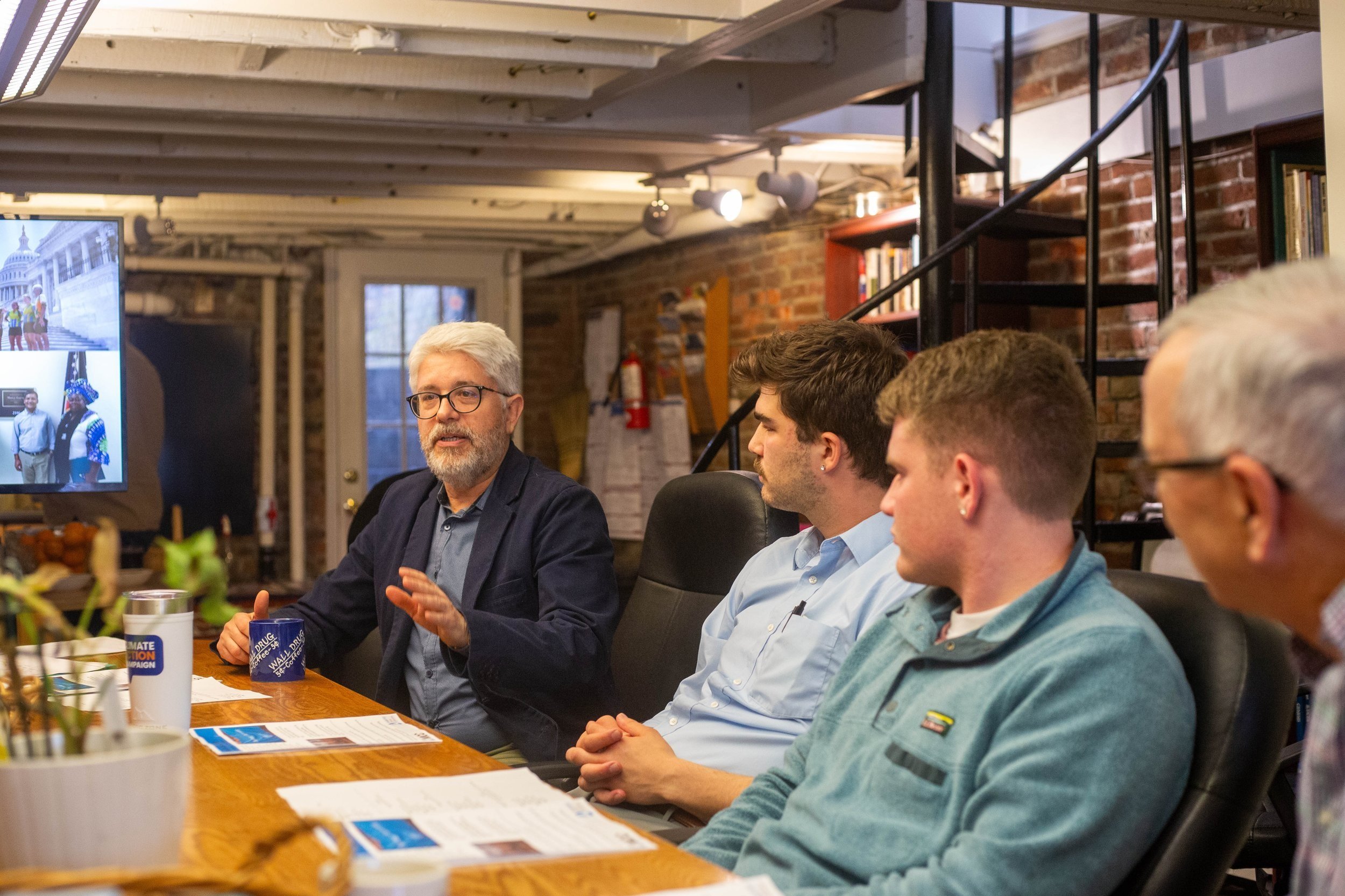
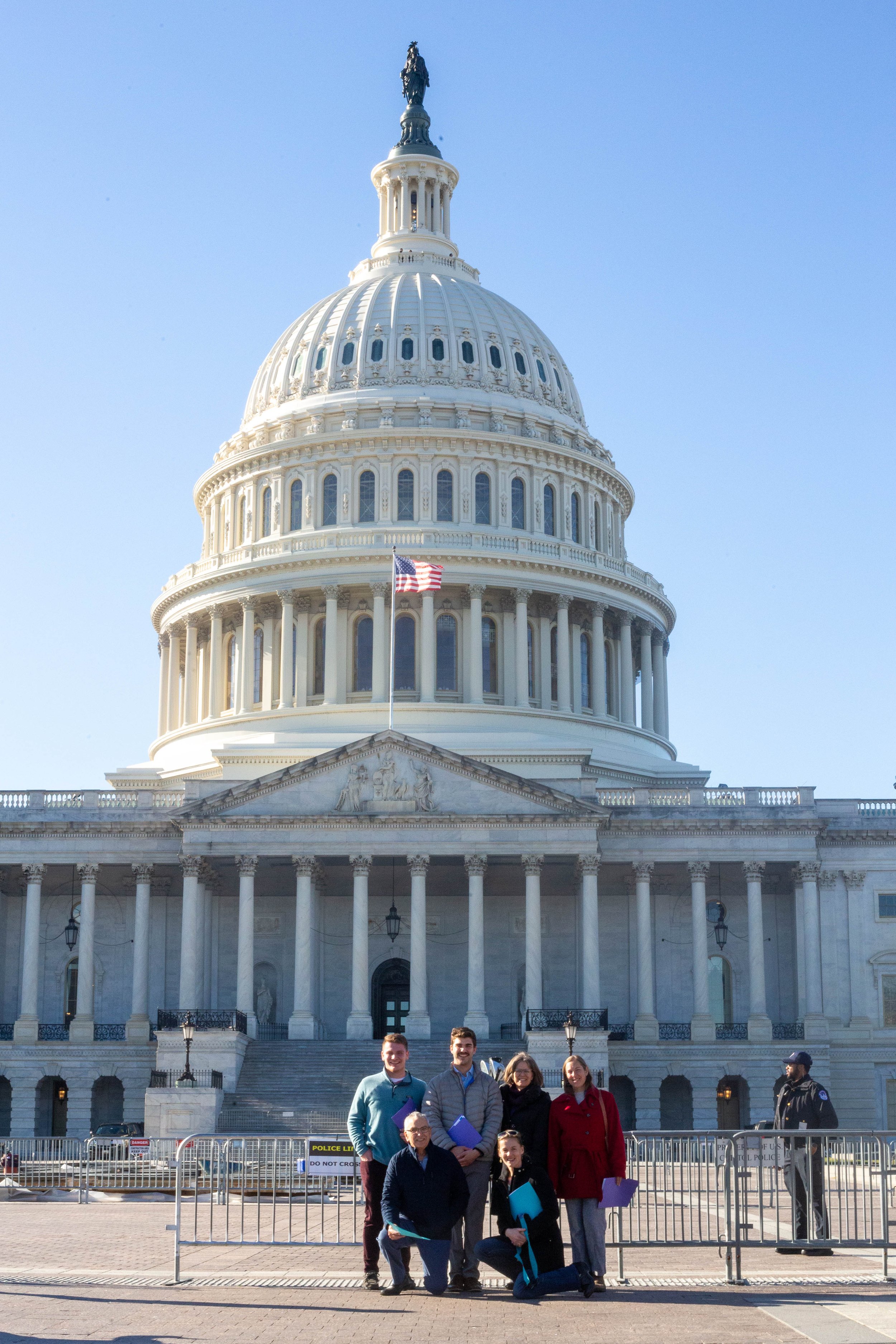
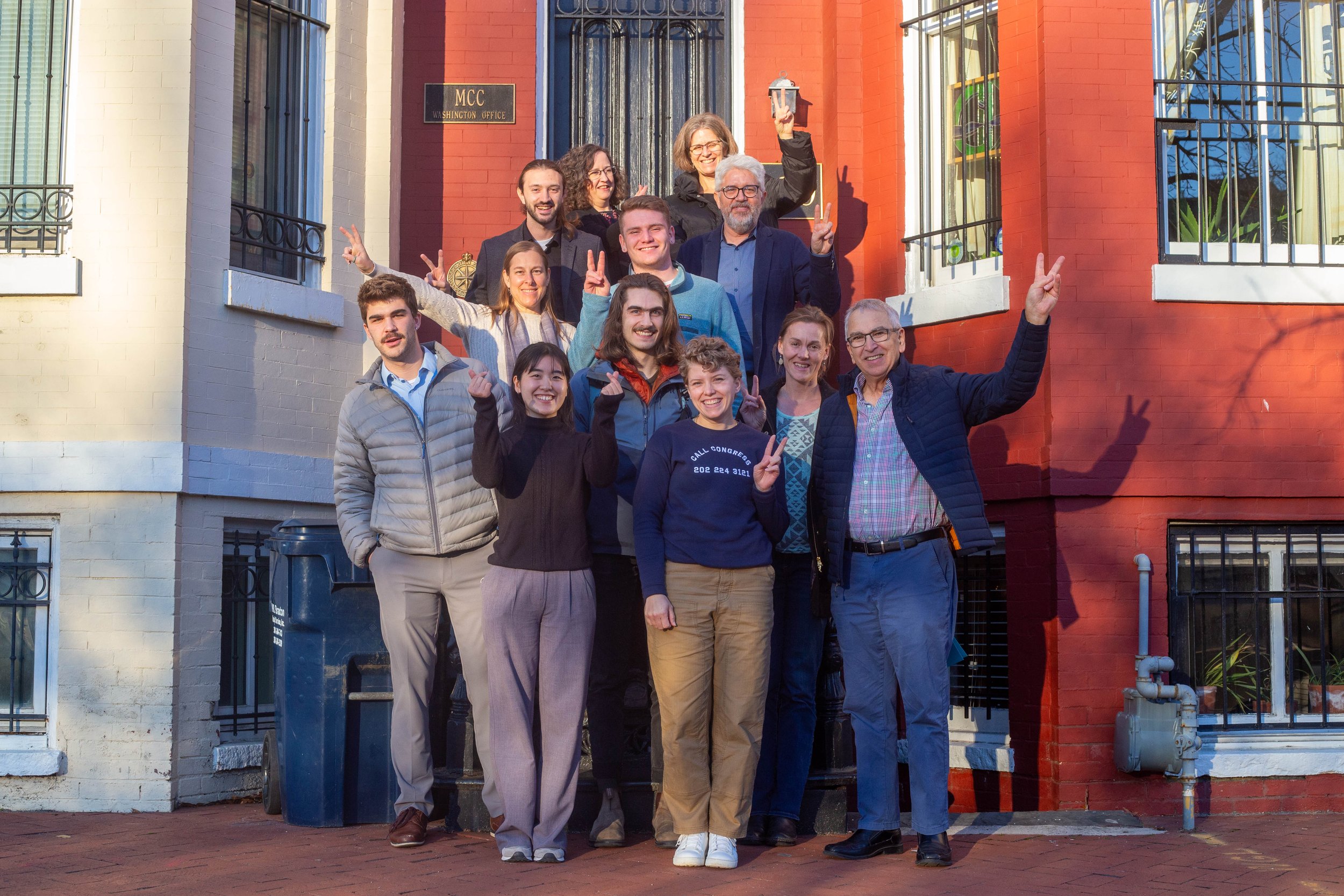
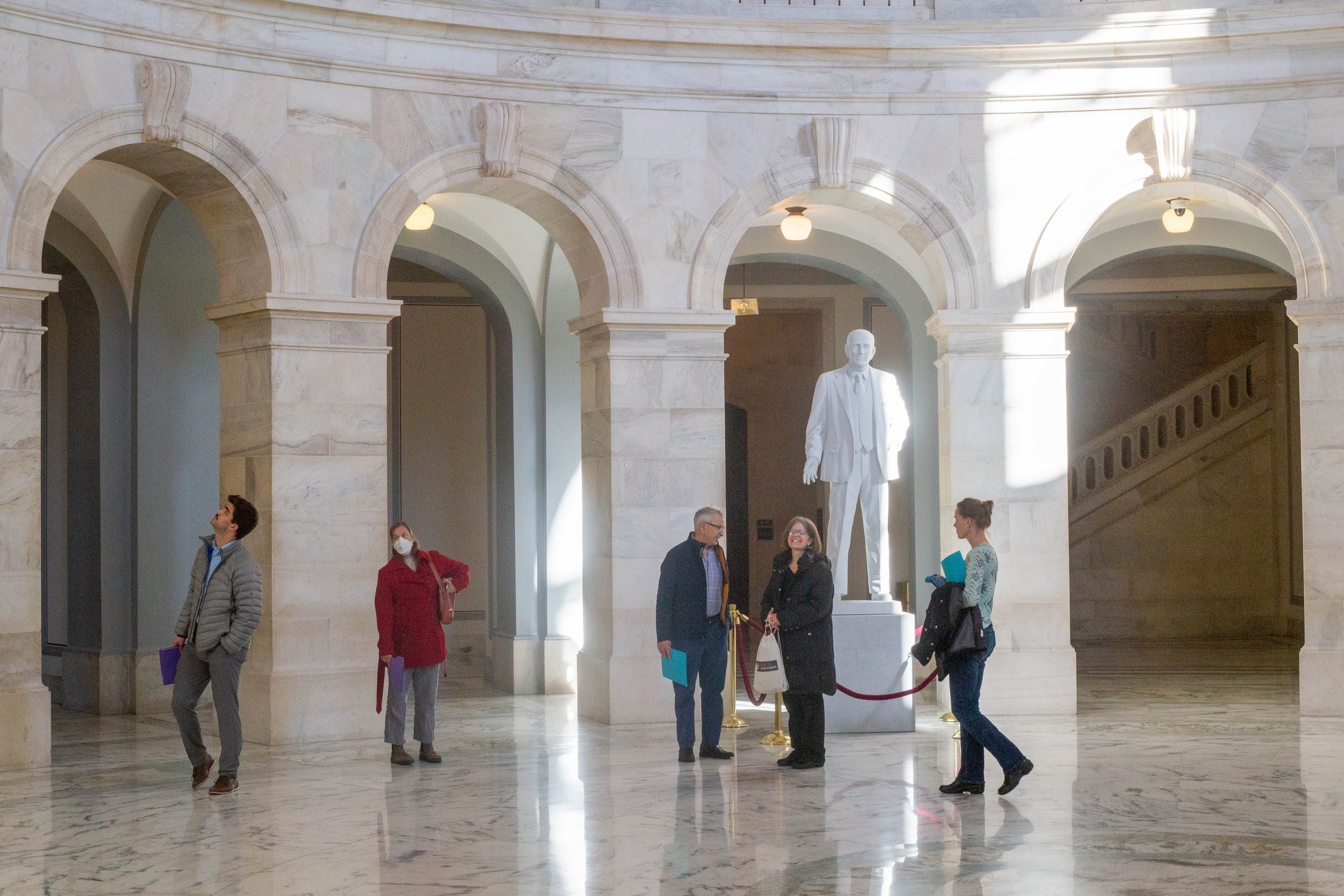
On Thursday, January 11, ACC and MCC gathered a group of 12 attendees from Indiana, Pennsylvania and Virginia to meet with senators and representatives from their respective states and districts. The goal of the day’s meetings was to advocate for maintaining or expanding funding for climate provisions in the Inflation Reduction Act (IRA) and State, Foreign Operations, and Related Programs (SFOPs) in the 2024 federal budget. Shortly before our meetings, House and Senate leadership had come to a topline deal that would have protected climate investments made by the Inflation Reduction Act. Our ask focused on ensuring that this was upheld (or, ideally, to have climate funding expanded!).
Our meetings with our senators’ and representatives’ offices went well: the Pennsylvania group bonded with staffers over various issues, the Virginia group learned valuable information on the positions and plans of their senators on climate-focused issues including the Mountain Valley Pipeline and offshore wind projects, and the Indiana group had the opportunity to speak directly with Indiana state representative Rudy Yakym in the house gallery while the house was in session.
On January 18th, a week after our meetings and just under two weeks since the settling of the topline deal for the federal budget, conservatives in the House raised concerns and some even threatened to oust Speaker Johnson if he were to go through with the topline deal. Because of this, the House and Senate each passed another Continuing Resolution that will fund the government at 2023 levels until March 1 and March 8. For now, climate investments are protected; we have hope that this will be maintained in the upcoming deal to be made in March.
These advocacy gatherings coordinated with MCC Washington are always a fruitful experience for those able to attend. Here are some quotes from attendees:
Laura Pauls-Thomas, Communications Director for MCC East Coast
“When I think about the different ways I engage in climate advocacy, visiting my members of Congress in Washington D.C. is one of my favorite ways to make my voice heard. It feels important to meet lawmakers face-to-face, and entering those meetings alongside other Anabaptists who share my faith and values makes me feel hope and belonging. I’m grateful to ACC and MCC for pulling together this opportunity for intergenerational collective action!”
Galen Fitzkee, Legislative Associate, MCC Washington Office
"Our National Peace & Justice Ministries Washington Office staff was very glad to welcome this group to Capitol Hill! Whenever Mennonites are compelled to use their voices to do political peacemaking, we will be ready to work with them!"
We are grateful to MCC Washington for the coordination and knowledge they provide in pulling together these advocacy days and making them a reality.
Why I Advocate on Climate
Director’s Note, Rev. Douglas Day Kaufman
Like many Americans, I am skeptical of the political process in the US. Politicians do not seem responsive to the will of the people. In many regions one party or the other dominates enough that they can create district maps that work for them rather than for democracy. No wonder that in a 2019 poll, Gallup found that only 6% of Americans have a great deal of confidence in the federal government to handle domestic problems.
Yet since beginning my work in climate change six years ago, every year I have gone to Washington DC to meet with legislative offices. Why do I bother?
My start in advocacy in DC came when I attended The Summit with Sojourners in 2019. We advocated on climate change and for maternal health. I was skeptical that this did any good. Why would they listen to us?
I felt the least listened to with a staffer at Senator Michael Braun’s office. But then a few months later, his office contacted me about his intention to form the Bipartisan Climate Solutions Caucus in the Senate with Senator Chris Coons. They asked me for a statement of support, which I provided, writing how my faith in God as creator impacts my support for addressing climate change.
While I don’t think my previous visit somehow changed Senator Braun’s mind, I am glad I was part of pushing him in that direction. He eventually authored legislation to help farmers receive support in bringing carbon sequestration practices to their farms.
So I am less skeptical today. I am not sure how much difference it makes, but I think it makes a difference. Some of the loudest voices of faith are either against addressing climate change or see it as irrelevant. I am there to advocate for a gospel of all creatures, that God’s grace and love includes all creation.
Any careful reading of the Bible demonstrates a long connection between God, the people and the wider creation. The Hebrew prophets inspire my climate advocacy. Often missed is how often the prophets addressed the rulers.
In Jeremiah 4:23-26, the prophet sees an unraveling of God’s creation in Genesis 1. Walter Brueggemann noted once that Jeremiah seems to describe climate change. Jeremiah concludes (vv. 27-28): “The whole land shall be a desolation…Because of this the earth shall mourn, and the heavens above grow black…”
I see the unraveling of creation today. I see the mourning of the earth. And so similar to Jeremiah, I find that I need to speak. Following God’s call on creation burns so strong within me that I cannot stop (20:9).
So I continue to advocate, and as I do I find I am less skeptical of the political process. By engaging in this, I help our political process to work. At least I pray that it may be so.
Anabaptist Climate Collaborative is Hiring!
Collaborations Director
Anabaptist Climate Collaborative seeks a collaborations director. This relational networker would collaborate with the executive director in creating both program and financial partners. While this is a new role, it builds on the work done by previous advancement directors Mark Lancaster and Anna Ruth Hershberger. Anna Ruth is currently serving as interim advancement in a quarter-time role.
A challenge as deep and urgent as climate change needs substantial collaborative partnerships. This half time role leads with the executive director in forming such collaborations, along with fundraising and advancement. A key component is convening Mennonite-related agency leaders and other partners in seeking climate justice through Anabaptist values, community, and faith.
For more information, including a copy of the position description, go to https://www.anabaptistclimate.org/jobs or contact executive director Doug Kaufman at director@anabaptistclimate.org.
Climate Advocacy Internship
The Climate Advocacy Internship is a part-time (30 hours/week) summer internship for students with an interest in Climate Action, Domestic Policy, and Advocacy. Students will engage in advocacy, organizing, and lobbying with Mennonite Central Committee U.S. National Peace & Justice Ministries, with a specific focus on mobilizing the Anabaptist community around climate issues.
The Climate Advocacy Internship is typically based in Washington, D.C., and includes housing and a monthly stipend; however, fully virtual and hybrid work is possible. This is a roughly 3-month position taking place over the summer of 2024. For more information go to https://www.anabaptistclimate.org/jobs or contact joseph.harder@anabaptistclimate.org.
Climate Communications Intern
The Communications Internship is a part-time (10 hours/week) internship over the school year for students with an interest in Climate Communications and Writing or Video media development. Students will engage in media research, online communications, article writing and developing newsletters and reports for Anabaptist Climate Collaborative (ACC) and its website.
The Communications Internship is a remote position, with 10 hours per week expected. A summer internship would be an alternative. For more information go to https://www.anabaptistclimate.org/jobs or contact joseph.harder@anabaptistclimate.org.
Giving to Anabaptist Climate Collaborative
If you are reading this newsletter, chances are you care passionately about what is happening to this big, beautiful world in which we live. You care about the reality of climate change and you are concerned. We care and we are also concerned. We work hard to continue the three part focus of Anabaptist Climate Collaborative: support emerging leaders, empower diverse voices and establish an Anabaptist network.
With my whole heart, I believe the focus of Anabaptist Climate Collaborative is THE most important issue of our time. Doing this work is connected to peace. It is connected to racism. It is connected to recognizing the glory and might of our God of Life. Doug Kaufman helps pastors process their emotions around climate change and then actively engage the issue with their church. We continue calling out young leaders to be advocates on college campuses for mitigating climate change. Because of us, other Anabaptist organizations are shifting their work to seriously look at how they’re addressing climate change.
Tell me. If you haven’t given to us, what is stopping you? What can we do to help you move towards making a donation? This work is late in coming. We’re all guilty of the fact that Anabaptist Climate Collaborative started so late, but now we’re here. Please consider making a donation and inviting two or three others to join you in giving. The work is important and we need your support.
Anna Ruth Hershberger, (574) 538-9632.
Climate Pollinators
Last week we completed the Climate Pollinators webinars, a partnership with the Mennonite World Conference Creation Care Task Force, with a focus on North America. Previous webinars covered the other four MWC regions: Africa, Asia, Europe, Latin America. If you missed one, they are available on the website as recordings.
Sierra Ross Richer, one of the participants in the Climate Ride, introduced the speakers and their stories. Sierra wrote the original series based on interviews gleaned from a global survey that the MWC Creation Care Task Force initiated. That series had a new story each day of Lent, and is still available on our website or as a book.
Upcoming Events
Relief Sales
Look for us this year at an MCC relief sale near you! We are making plans for staff and volunteers to participate in some of the major relief sales. We are grateful for the significant support we received from MCC, both as a financial partner and a program partner. Having a table at the relief sales will help us spread the word about our fledgling organization. If you are interested in being part of our table display, contact executive director Doug Kaufman at director@anabaptistclimate.org.
Doug on Green Lectionary Podcast
Executive Director Douglas Day Kaufman recently recorded an episode on the Green Lectionary podcast, a production of one of our partners, Creation Justice Ministries (CJM). The episode is hosted by CJM’s Derrick Weston and includes Dr. Jerusha Neal, a professor of homiletics at Duke Divinity School. Reflecting on John 2:13-22 for Lent 3, they have an enriching conversation about the animals freed by Jesus in the cleansing of the temple. Doug reflects on the Anabaptist teaching of the gospel of all creatures, that Christ is present with, and redeeming, all creation.
ACC/SAN Spring Retreat in Chicago, IL
Anabaptist Climate Collaborative and the Sustainability Alumni Network will be gathering a group of students and young adults in Chicago, IL from March 7th to 10th for a retreat. Attendees will participate in the Chicago Food Policy Action Council’s Food Justice Summit, attend panels and hold discussions on climate action, burnout, and enacting climate projects in their particular settings and communities.
Resources
One of our partners, the Mennonite World Conference Creation Care Task Force, recently joined a global interfaith call for a fossil fuels nonproliferation treaty. Read about it at Anabaptist World.
December 2023 Blog
Attendees to ACC’s Pastoral Care for Climate retreat gathered around a fire for worship at Camp Friedenswald in Michigan on December 5th, 2023.
During this Christmas season we pray for peace on earth, and peace with earth.
Who cares about climate change?
Director’s Note, Rev. Douglas Day Kaufman
Why don't people care more about climate change? This question has animated my time with the Anabaptist Climate Collaborative. The science of climate change is frightening in its implications, that we are moving towards destroying the livability of our planet.
Yet most people live their lives as if it’s not very important. Why is that?
Well, who wants to spend all their time thinking about the dire consequences of a changing climate? So many of us practice what sociologist Kari Norgaard calls implicatory denial, where people who don’t deny the facts of climate still deny the moral, social, and political implications.
Norgaard spent a year in Norway during one of the warmest winters on record. With their love of winter and the wilderness, this was difficult for them. But they hardly mentioned climate change, not because they deny the facts. In Norway there is very little of this hard denial. She discovered a soft denial that helps us avoid the terrifying implications of the changing climate. We do this to avoid uncomfortable feelings of helplessness, guilt, and fear.
At its best, the church can be a place where people bring their difficult emotions and find a way to practice hope and love. My faith has helped me through challenging times in my personal and social life. Pastors and congregations walk with people in the midst of sickness and death; we struggle for and with people who experience injustice and violence. Pastors need to learn to listen and speak into difficult situations. We have ethics and rituals that remind us that God brings new life in the midst of death, and hope in the midst of despair.
So I started pastoral retreats on climate change to help pastors guide congregations in confronting climate change. This fall I came full circle. I led the first retreat called “Who cares about climate change? Pastoral responses to denial and despair” at Camp Friedenswald in September 2018. And now I offered a pastoral retreat again at Friedenswald. This time it was a new approach where 15 pastors met with many leaders throughout the year.
In between these Friedenwald bookends I have led 15 retreats across North America, engaging with almost 400 pastors and leaders through these years. In 2022 I began a partnership with Creation Justice Ministries to offer the retreats to interdenominational groups, offering an Anabaptist perspective more broadly. If you include other engagements, such as sermons, Sunday School classes, college and seminary classes, academic conferences, it is more like 3000 people.
I encourage people to care about the climate and to care for the climate. I offer social and spiritual resources for doing so. And after all, I am encouraging people to care in the way God cares.
Pastoral Care for Climate
Emerging Leaders
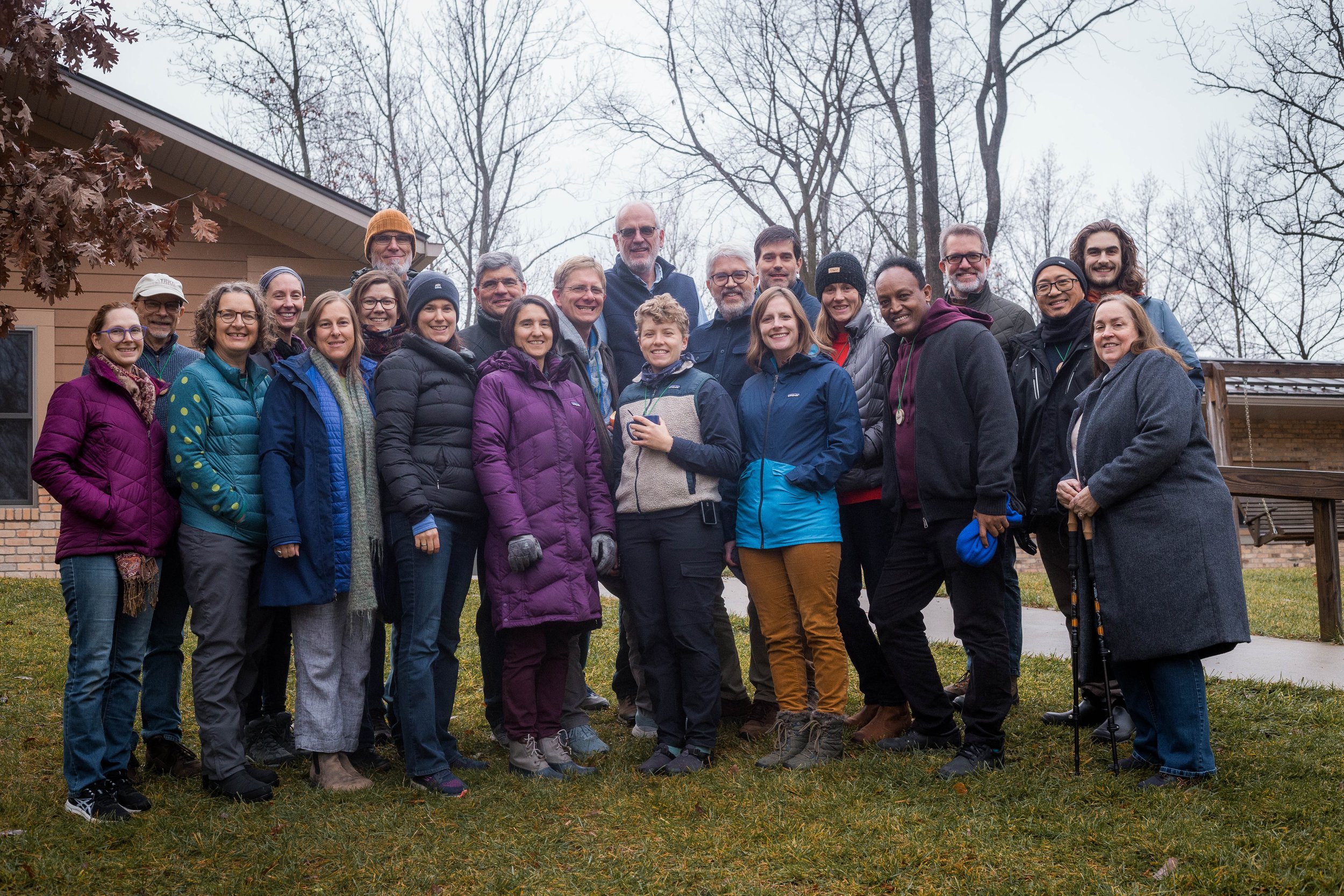

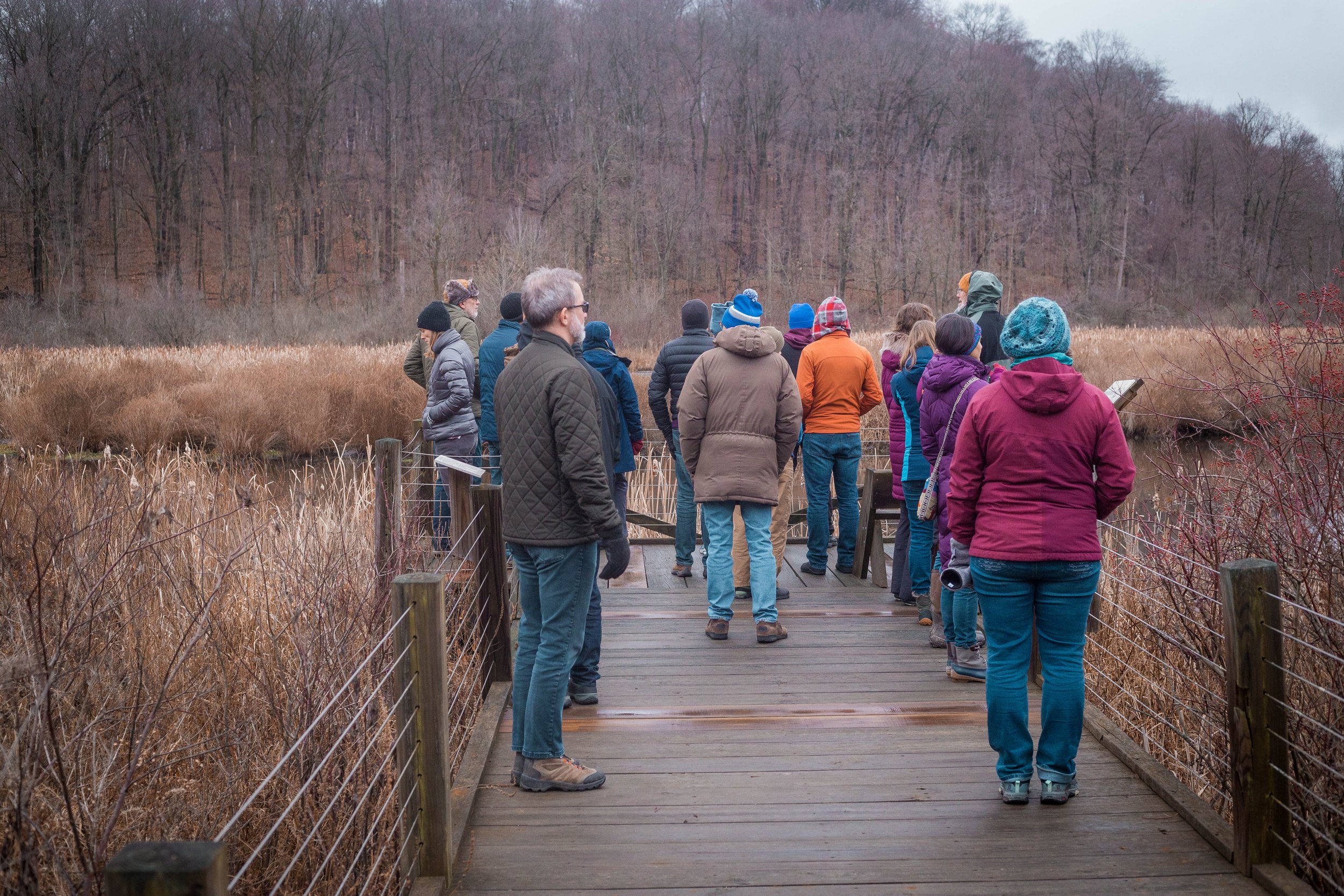

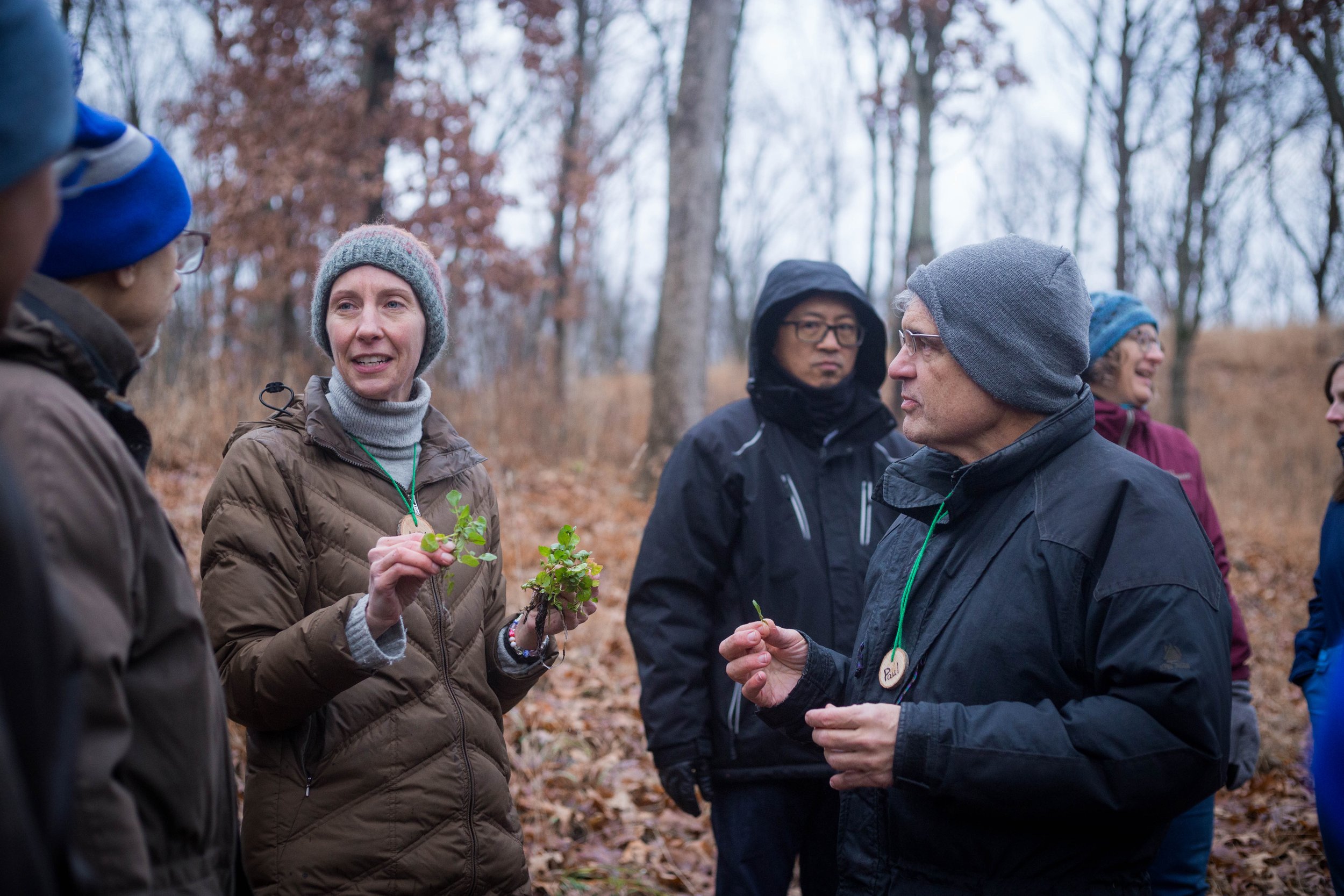
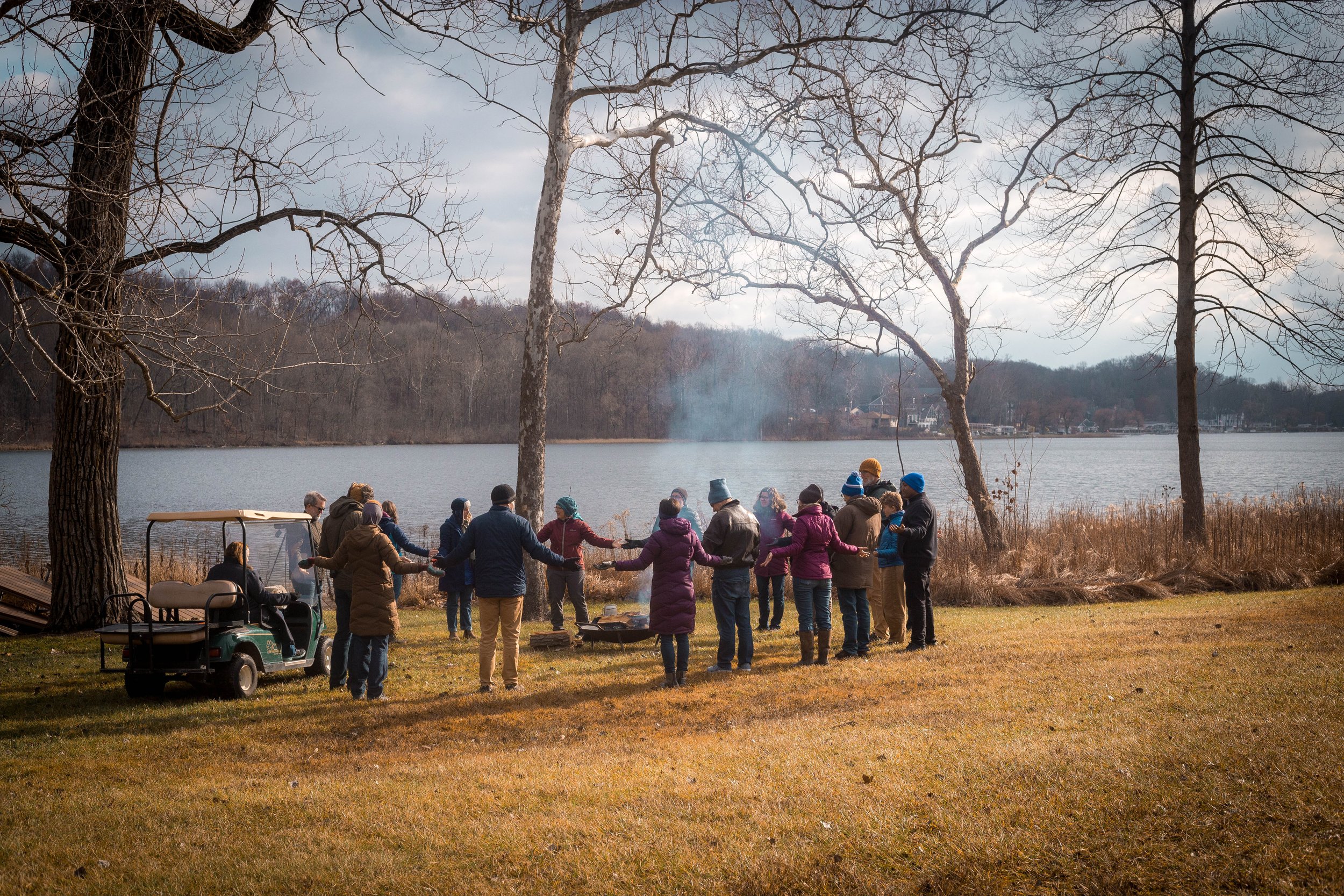
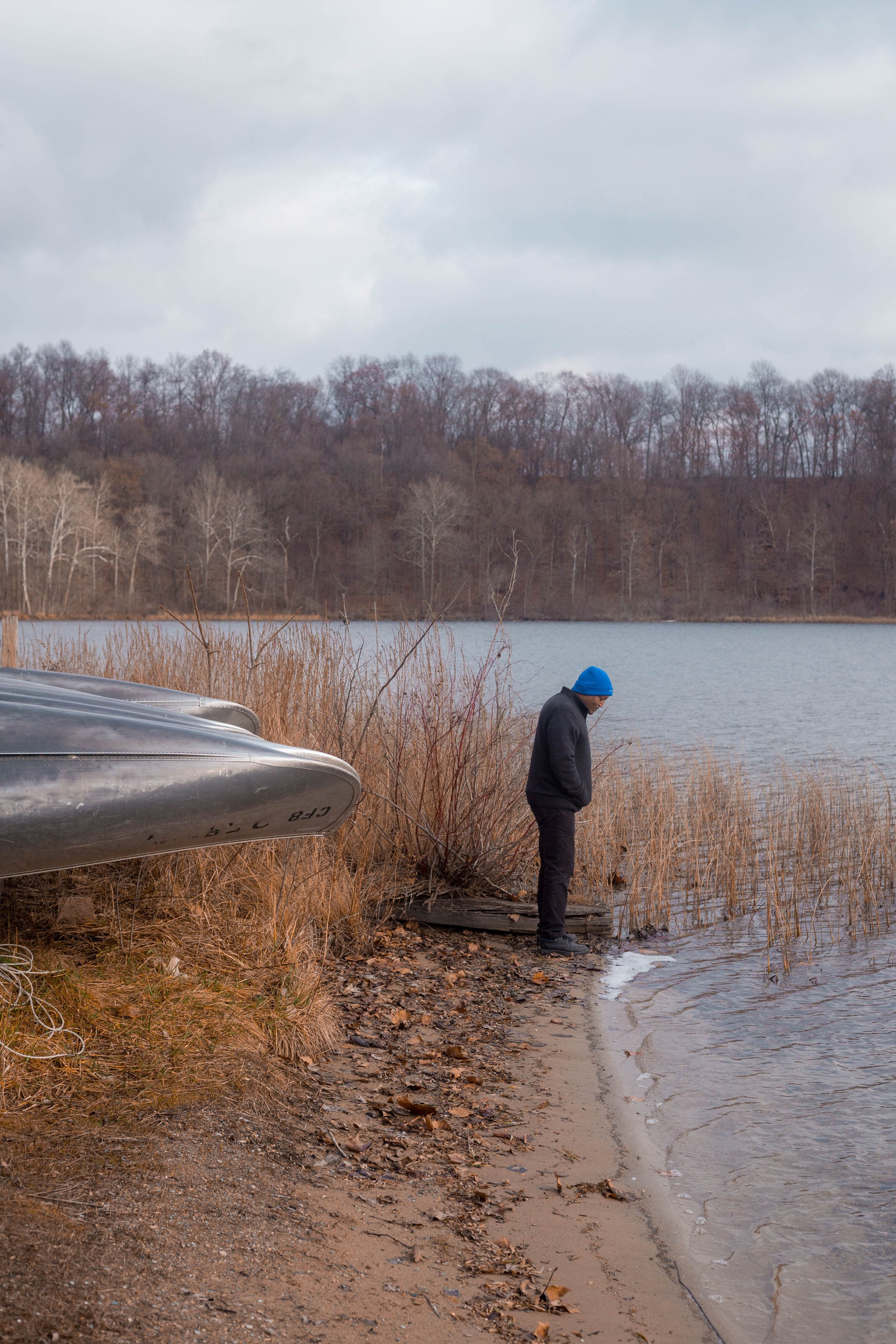
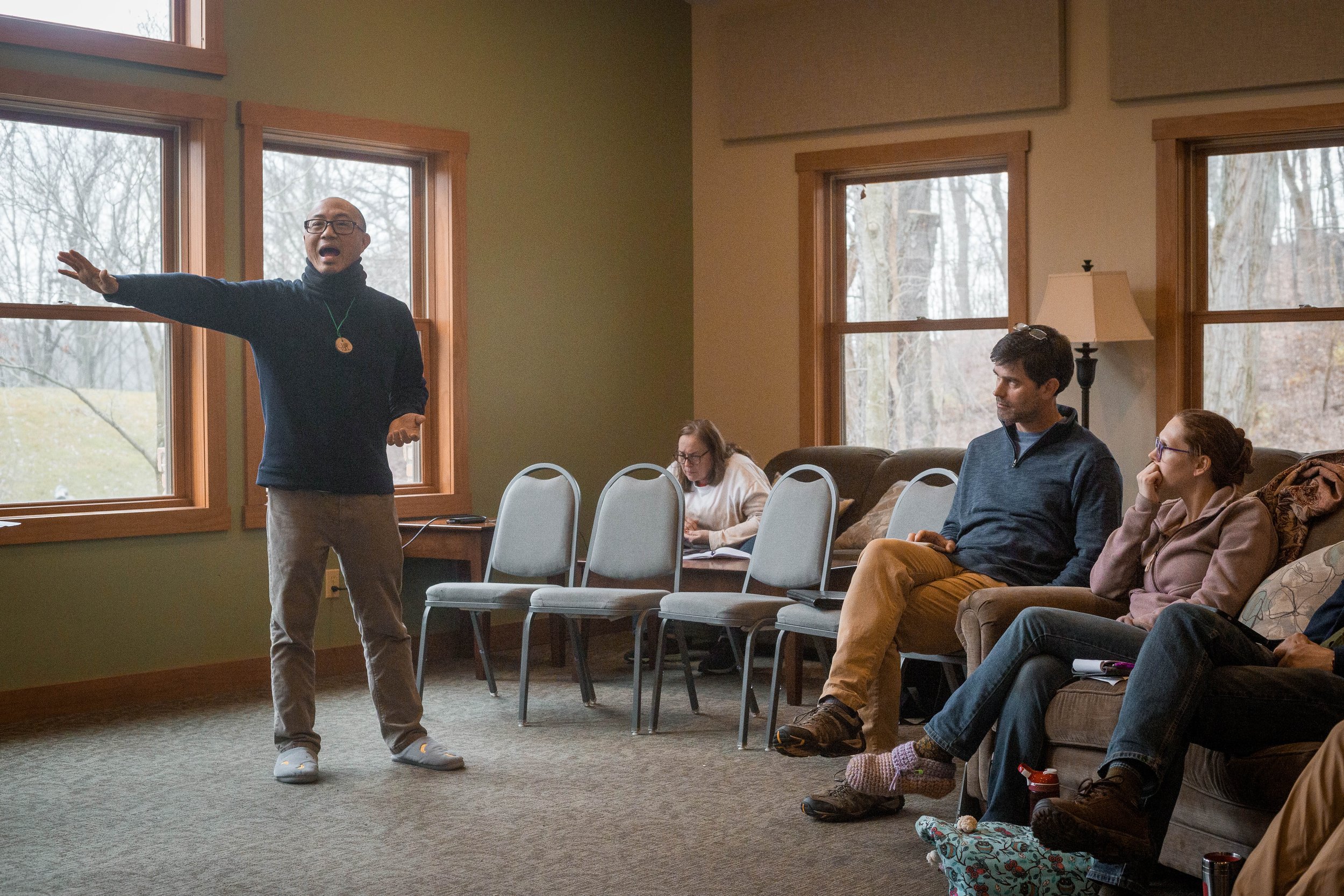
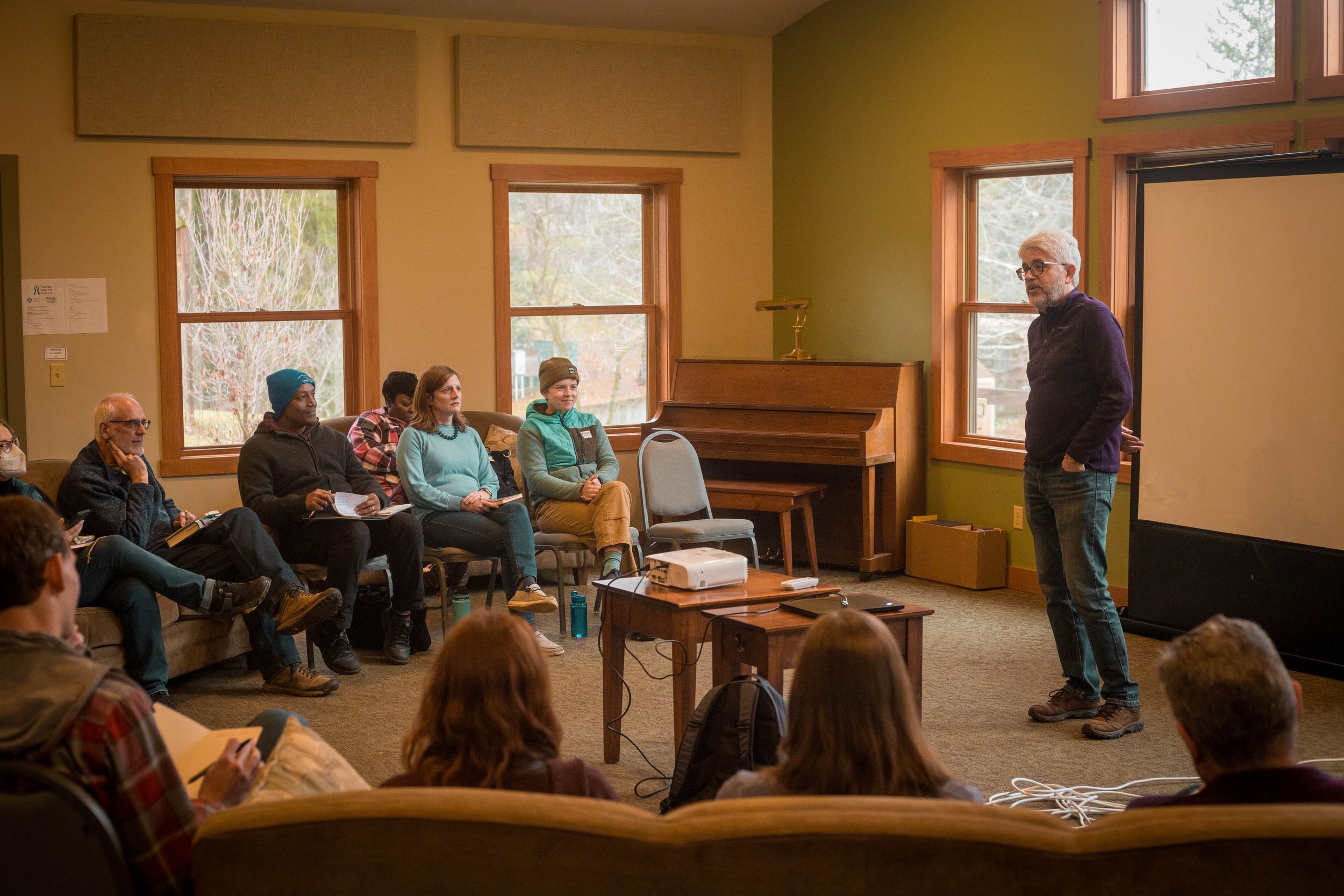
Earlier this month, we enjoyed the final retreat of our Pastoral Care for Climate cohort, a partnership with Eastern Mennonite Seminary. 22 pastors and leaders gathered for three days at Camp Friedenswald in Michigan. In a new configuration of our retreats, this group met over the course of a year, beginning in February at Highland Retreat Center in Virginia.
In between these two retreats, the group met on Zoom to hear from climate leaders. Topics related to climate included science, pastoral care, natural disasters, racial justice, indigenous justice, peace, global discipleship, Anabaptist ecological theology, and more.
Friedenswald was itself a learning experience as they told us about their sustainability plan. They have installed solar panels, planted trees, reduced food waste, moved towards more just relations with their indigenous neighbors, the Pokagon Band of Potawatomi, and much more. A critical learning experience was a day in Washington DC to advocate about mining critical minerals for the green economy. Silver Run Forest Farm in the Shenandoah Valley was a hopeful place practicing agroforestry, watershed health, and restorative justice.
The pastors gathered represented churches from across North America: Pennsylvania, Manitoba, Montana, Indiana, Texas, Virginia, Ontario, and North Carolina. While most of these congregations worship primarily in English, with some Spanish mixed in, one worships in Laotian and another in Eritrean.
Participants had this to say:
Miriam Mauritzen, Mountain View Mennonite Church, Kalispell, MT
“The diversity, depth and openness of the group provided the introductions, space, and conversations needed to germinate and try new expressions of peacemaking through climate care. Friedenswald and Amy Huser were a perfect accompaniment to cap off the year.”
John Stoltzfus, Park View Mennonite Church, Harrisonburg, VA
“This experience has helped ground me in my identity as a colaborer with God and others in bringing shalom to all of God’s creation. I’ve been challenged to look beyond my own circle of interest to truly consider how we are interdependent and responsible for the wellbeing of all God’s creatures.”
Sandy Plett, Stanley, MB, climate action coordinator for Mennonite Church Canada
“I loved getting connected to this amazing group of passionate folks attending to climate wounds.”
David Moser, Southside Fellowship, Elkhart, IN
“The resource people who were all brought in were excellent. It was really inspiring to connect with others who care about climate change and to learn from them. I am grateful. It was good to learn that doing something even if we can not do it all, does something, can be a source of hope. Being a part of this group helped me move from despair to a grounded sense of hope. Doug Kaufman did an excellent job of facilitating us.”
Advancement Director Transition
This fall we experienced a change in the Advancement Director, moving from Mark Lancaster to Anna Ruth Hershberger as interim. In 2020 - 2021 she served as the first Advancement Director with the Center for Sustainable Climate Solutions (CSCS), the precursor of Anabaptist Climate Collaborative.
She initiated the Climate Ride, when a group biked across the United States to raise awareness and funds for CSCS. During this time she saw CSCS experiencing growing pains and as time passed she experienced some of her own. Months following the news of her pregnancy, she turned her attention towards the new life growing in her.
Now, in a new season of her life, Anna Ruth is excited to see what unfolds for the organization and anticipates strong connections working with the many people who care about the state of our world and the reality of life as we know it.
Mark Lancaster served as Advancement Director from April 2021 to October 2023. He was part of the transition from CSCS to being a partnership of Eastern Mennonite University, Goshen College and Mennonite Central Committee, to becoming an independent nonprofit organization, the Anabaptist Climate Collaborative.
Mark believes this change in just a year has been spectacular. He appreciates how the new board has willingly taken on a great deal of work to help to move the organization toward both sustainability and relevance to the wider Anabaptist and faith communities. He rejoices at the deep commitment he senses from the board and the new director, Rev. Douglas Day Kaufman.
Mark will be working for Faith In Action, a leading grassroots organizing network, with whom he had worked earlier in life. They will be engaged in supporting disenfranchised people in the upcoming presidential election.
Upcoming Events
MWC Climate Pollinator Webinars
The webinars with our partner Mennonite World Conference Creation Care Task Force continue for two more months. The next one on January 16 at 14:00 UTC is focused on Latin America with Juliana Morillo moderating. This will be in Spanish with translation into English. This is an excellent opportunity to hear from Anabaptists globally on how they are addressing the climate crisis.
Register for the webinars here.
Global Voices
This speaking tour is a partnership with our major sponsor Mennonite Central Committee. MCC partners in Zimbabwe and Cambodia will speak about how they are responding to climate change. They will travel through all four MCC regions in the US from February 16 to March 1. Let us know if you would like to host them at your church, college, or organization by contacting Galen Fitzkee at galenfitzkee@mcc.org. ACC is also hiring a global voices coordinator to accompany the speakers and coordinate their travel, room, and board.
Learn more about the Global Voices tour from this flyer.
DC Advocacy Day on January 11, 2024
Want to make your voice heard on the climate crisis? Join ACC and the Mennonite Central Committee Washington Office for a climate advocacy day on January 11, 2024. Participants will meet congressional staff to advocate for maintaining funding for the clean energy provisions of the Inflation Reduction Act. ACC and MCC will coordinate transportation and host attendees in Washington, both to prepare in advance and on Capitol Hill. While the focus is on people in the Harrisonburg, VA, area, we are happy to see if we can make other connections as well. Please register in advance.
Resources
Mennonite blog at COP28
Want a global Anabaptist perspective on COP28, the recent global gathering on climate change? Our partners at the Mennonite World Conference Creation Care Task Force hosted a series of blogs by Marijke van Duin. A member of the Mennonite Church in the Netherlands, she has observer status at these “Conferences of the Parties” through being part of the Working Group on Climate Change for the World Council of Churches.
This year was particularly interesting in light of the host nation being Dubai and the president being an oil executive. Marijke also offers perspective from outside North America, critiquing the US position in the final negotiations.
Thank you for your contributions!
On January 1 we are transitioning to receiving donations on our own. Eastern Mennonite University has generously been processing our donations as we get started, but beginning January 1 you can send donations directly to us at:
Anabaptist Climate Collaborative PO Box 1787 Harrisonburg, VA 22803On January 2 we will update our Donate button on the website to come directly to us.
October 2023 Blog
ACC gathered students, alumni, and community members to join the March to End Fossil Fuels in New York City on September 17, 2023.
Have hope, not too much, mostly in plants
Director’s Note
When it comes to climate change, hope is complicated. A Marshallese man told me about a conversation with his priest. The Marshall Islands is the most contaminated place on the globe because of 67 nuclear tests by the US military. Now the islands are being submerged in the ocean. Yet his priest told him that God would not allow the islands to disappear.
Usually I hear this from Americans who don’t want to change our fossil fueled lifestyle. Americans have contributed more to global warming than any other nation and so denying it protects us from responsibility and guilt. But this was coming from someone denying his victimhood.
This is a false hope. There is uncertainty around climate change. Global warming from greenhouse gas emissions is a human caused problem. The Biblical prophets teach us not to expect God to rescue us from the natural consequences of our actions.
On the other side of this false hope is climate doom, the theme of this year’s Rooted and Grounded: A Conference on Land and Discipleship. ACC was glad to co-sponsor this event with host Anabaptist Mennonite Biblical Seminary. Climate doom says we have already blown it on climate change so we might as well not do much about it.
While these approaches seem the opposite of each other, they have this danger in common: passivity. We can’t do much about it.
We are causing the problem and we can do something about it. The solutions are available. Buying electric cars and installing solar panels is a start, but we need to work together to bring our carbon emissions down. And we can help those most affected by climate change like those in the Marshall Islands.
I call myself hopeful about climate change rather than optimistic. What’s the difference? Optimism says it’s all up to us; we just need to grit our teeth and make the needed changes. Hope follows God’s life creating and sustaining presence in the world. Soil scientist Rattan Lal once called the soil the place where resurrection happens all the time; death becomes life.
This connects with the gospel of all creatures from early Anabaptist mystic Hans Hut, who saw all creatures as “members of Christ.” Christ is present with all creatures in their suffering, especially with creatures when they sacrifice their lives for others. We too must become more like Christ, leaving behind selfish pursuits so that all creation can thrive. I find hope in the Spirit of life working in creation. Creation herself is renewing and our work is to cooperate.
So I was caught with someone’s adaptation of food journalist Michael Pollan’s food rules: Eat food, not too much, mostly plants. Have hope, not too much, mostly in plants. We have our work to do; we also are on a planet where life thrives. Let us work together with Creator and Creation!
Rooted & Grounded
Emerging Leaders
ACC staff and student ambassadors gathered the last weekend of September for the Rooted & Grounded: A Conference on Land and Discipleship, hosted by Anabaptist Mennonite Biblical Seminary, in Elkhart Indiana. The conference, with a theme this year focused on resiliency in faith-based climate work, provided myriad workshops and presentations focused on various aspects of Anabaptist relationship to the climate crisis, along with space for attendees to reflect on their own experience and understanding of resilience in the climate space.
ACC brought our Campus Climate Ambassadors to the conference, supported by a grant from the Marpeck Fund. ACC has student ambassadors at Anabaptist college campuses throughout the US and Canada working to kickstart climate action on their respective campuses. The gathering at Rooted & Grounded served as the ambassador’s training for the year, providing a space for them to get to know each other and explore ideas regarding effective climate action. Four ambassadors attended the conference. Ambassadors also convened with other student groups, including a group from Canadian Mennonite University.
The conference was kicked off with a keynote address by Kaitlin Curtice, a Potawatomi Christian author and speaker. Curtice emphasized the value of indigenous perspectives in our work toward climate justice, along with highlighting the importance of personal and communal resistance to climate ‘doom.’ Other highlights of the conference included a workshop on personal resilience led by Leah Thomas, Assistant Professor of Pastoral Care at AMBS, immersion experiences that allowed conference attendees to get to know the context of their place in Elkhart from various perspectives, such as commemorating a major indigenous trail that runs through the AMBS campus or an exploration of creative agricultural projects in the area.
Douglas Day Kaufman, Executive Director of ACC, and Joseph Harder, ACC Program Assistant, both presented papers at the conference. Doug’s paper, titled “Grounded Hope amidst Climate Doom,” explored questions of appropriate ways of engaging hope while confronting the climate crisis, and Joseph’s paper, titled “Towards a Mennonite Eco-Hymnody,” was a culmination of his Climate Futures Fellowship centered around exploring the ways the natural world has been depicted in English-language U.S. Mennonite hymnals of the past 120 years.
Following the conference, ACC teamed with the Sustainability Alumni Network (SAN) to gather the ambassadors and other students attending the conference with recent college grads engaged in climate work. This group, numbering six students and seven alumni, convened at Goshen College’s Merry Lea Environmental Learning Center for a retreat providing space for processing of the events of the conference, continued community-building, and space to think and explore the woods and wetlands surrounding the campus.
The events of the weekend – both Rooted & Grounded and the SAN gathering that followed it – proved to be meaningful and invigorating experiences for those that attended, serving as a reminder of the massive value of community and discourse as we work to make a positive difference in the world. We look forward to seeing the work this year’s Campus Climate Ambassador cohort does on their campus, and excitedly anticipate continued involvement in Rooted & Grounded gatherings in years to come.
March to End Fossil Fuels
Building Networks
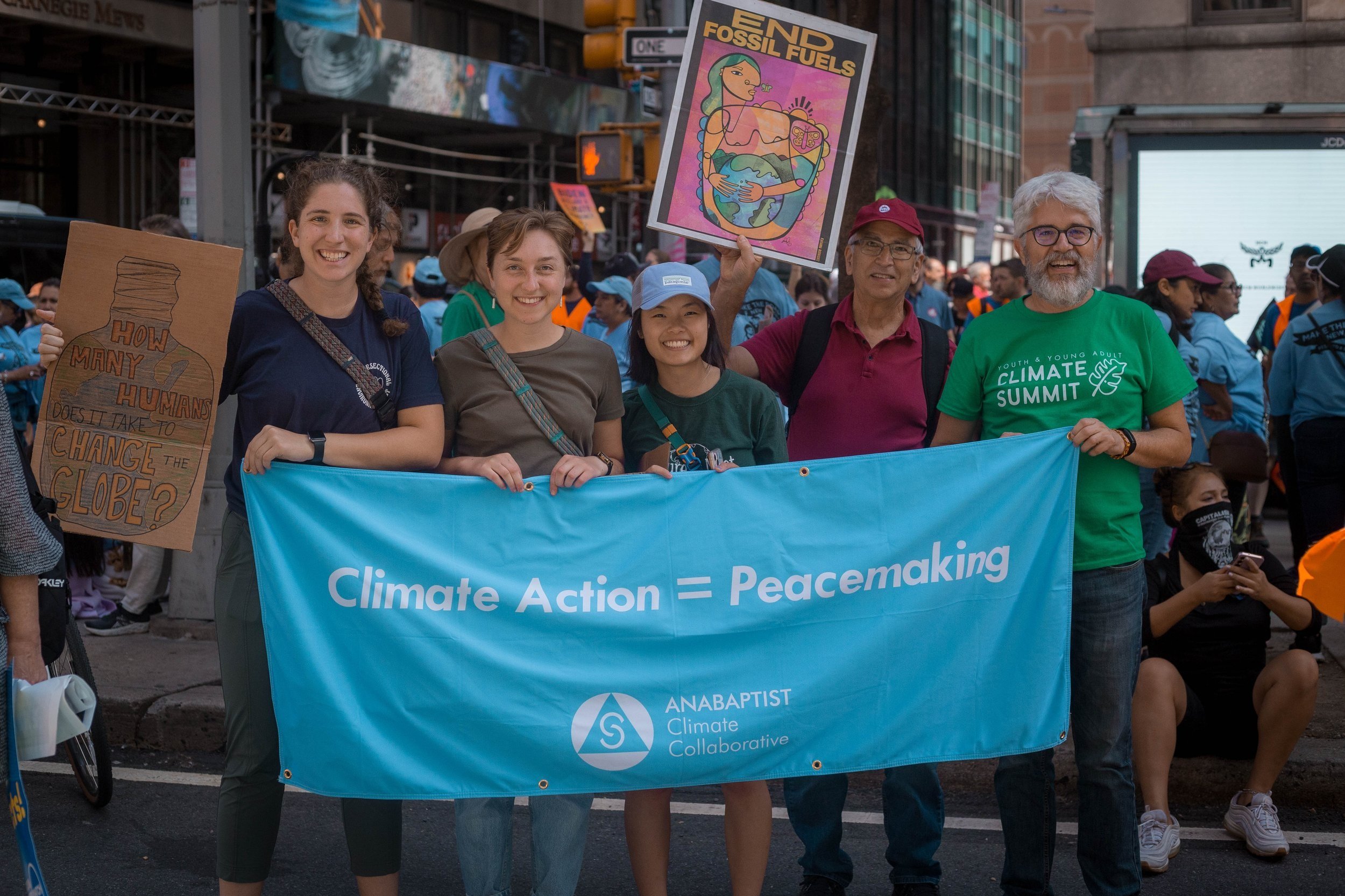
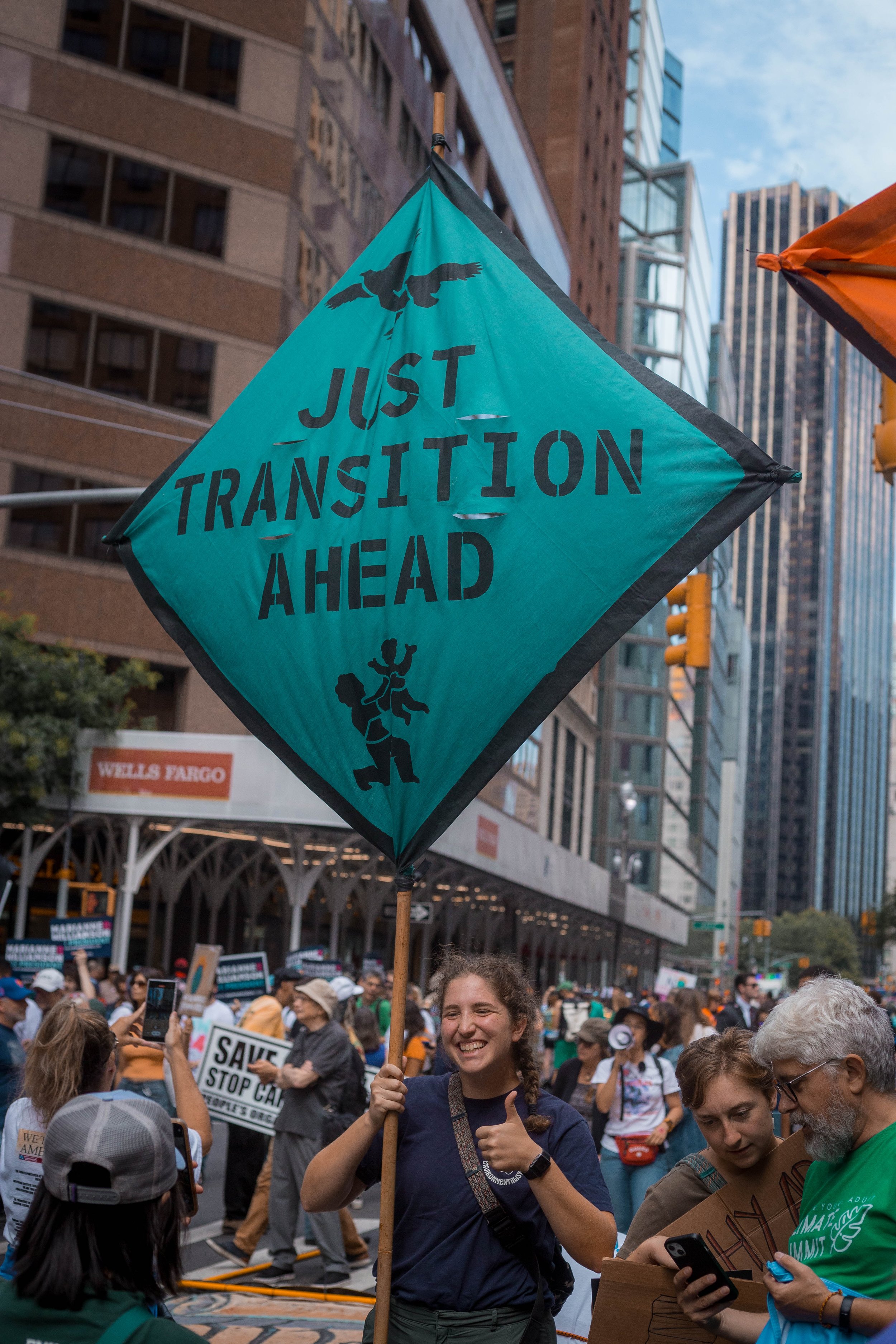
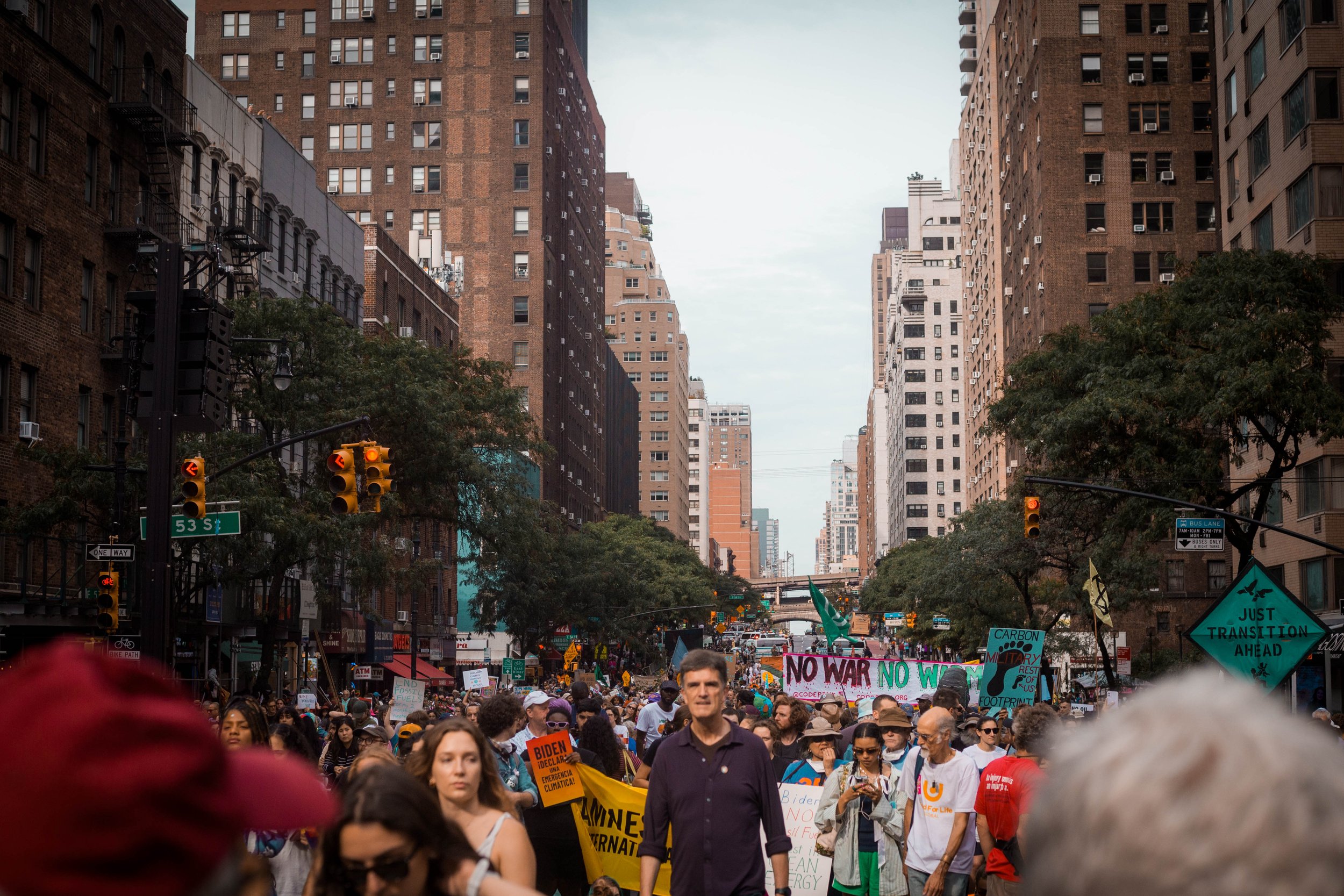

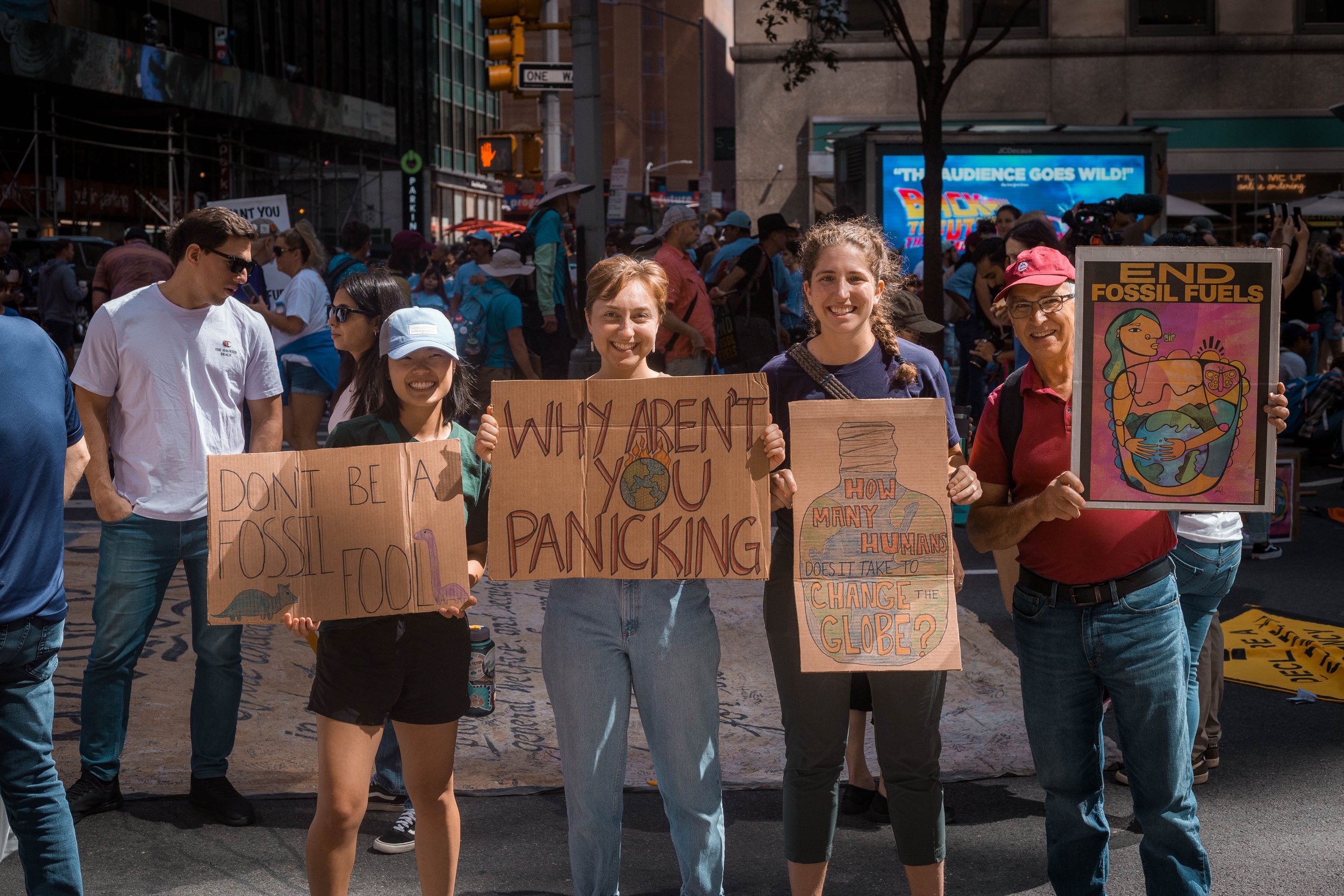




On September 17, 2023, the Anabaptist Climate Collaborative gathered with over 75,000 others in New York City to participate in a march advocating for world leaders to pivot away from fossil fuel extraction and use. The march, labeled as the March to End Fossil Fuels, took place three days before the United Nations' Climate Ambition Summit, which focused upon issues of integrity, accountability and implementation of climate projects and policy on a global scale.
ACC organized a group of nine people, comprised of staff, current and recent students, and community members to travel and march together. The group ranged in age from 10 to 70 years old.
The march started near the southwestern corner of Central Park, then marched roughly a mile and a half to the United Nations Headquarters, where marchers stopped and listened to speakers and musicians.
Want to learn more about the march? Read the New York Times write-up on the event.
Climate Pollinator Webinar Series
Empowering Diverse Voices
You are invited! Join us for Climate Pollinators, a webinar series on creation care.
This webinar is jointly organized by the Creation Care Task Force and Anabaptist Climate Collaborative.
In these webinars, MWC’s Creation Care Task Force members from each region will host one hour of storytelling and Q&A. Church members from around the world will share how they are affected by climate change – and responding with resilient action and gospel hope.
Next week’s MWC webinar will be hosted by Dr. Sibonokuhle Ncube, a member of the ACC board.
A Word on Generosity
Fundraiser’s Note
There is a fascinating discussion in philosophical circles that is called the “principle of the one and the many”. Simply put, this principle is about finding principles that bring unity in the midst of the diversity that surrounds us. This particular principle attempts to make sense out of the world around us.
I think the “principle of the one and the many:” can also speak to the nature of human beings. We are not all the same, but we are all connected to one another, just as we are connected to the flora and fauna that surrounds us. Some human beings are innovative in their thinking and are leaders. Some are willing followers and doers. And the world needs both kinds.
The Anabaptist Climate Collaborative began when one creative and generous person had an idea that people of Anabaptist faith would care about climate change and want to do something about it. He was willing to generously support our work for the first six years of our existence as the Center for Sustainable Climate Solutions. The one had acted for the many.
We are now in a new era, as we move to embrace our work as a separate 501c3 organization. We invite you now to help us move from the one to the many, as you offer your financial support for our vital work in the Anabaptist community and beyond. We need seek the support of the many, both to honor the generosity of the one and to be part of a larger work to create unity, in the midst of diversity, when it comes to positively impacting climate change.
Look for upcoming communications from us about the new direction and programs we will be taking with our work and how you might be able to join us in that work. Most especially, we hope you will consider making a 2-3 year financial commitment to help us assure we can achieve our goals and grow our donor base. Thank you in advance for your generosity.

